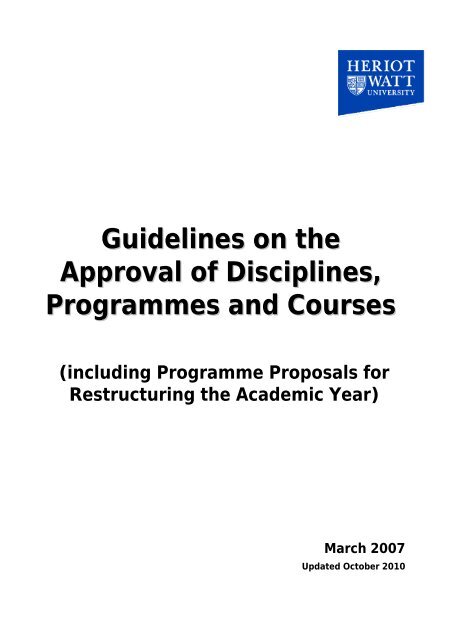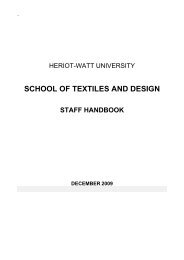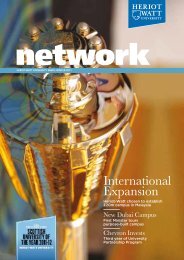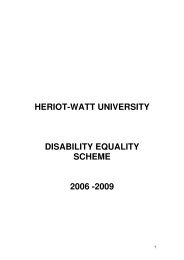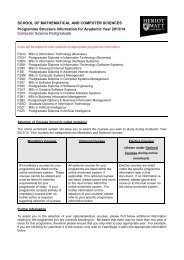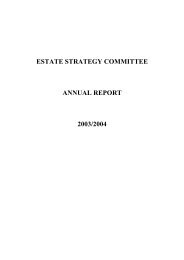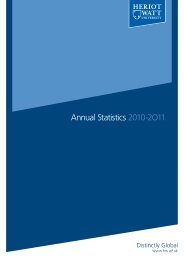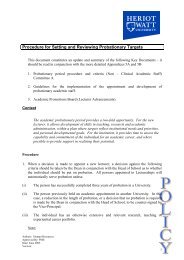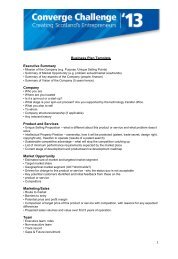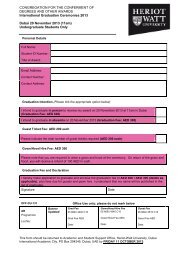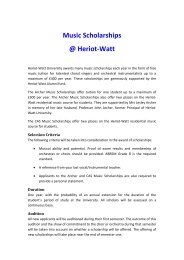Guidelines on the Approval of Disciplines, Programmes and Courses
Guidelines on the Approval of Disciplines, Programmes and Courses
Guidelines on the Approval of Disciplines, Programmes and Courses
Create successful ePaper yourself
Turn your PDF publications into a flip-book with our unique Google optimized e-Paper software.
<str<strong>on</strong>g>Guidelines</str<strong>on</strong>g> <strong>on</strong> <strong>the</strong><br />
<strong>Approval</strong> <strong>of</strong> <strong>Disciplines</strong>,<br />
<strong>Programmes</strong> <strong>and</strong> <strong>Courses</strong><br />
(including Programme Proposals for<br />
Restructuring <strong>the</strong> Academic Year)<br />
March 2007<br />
Updated October 2010
<str<strong>on</strong>g>Guidelines</str<strong>on</strong>g> <strong>on</strong> <strong>the</strong> <strong>Approval</strong> <strong>of</strong> <strong>Disciplines</strong>, <strong>Programmes</strong> <strong>and</strong> <strong>Courses</strong><br />
(including Programme Proposals for Restructuring <strong>the</strong> Academic Year)<br />
CONTENTS<br />
Preface 3<br />
Part A Background to <strong>the</strong> <str<strong>on</strong>g>Guidelines</str<strong>on</strong>g> 4<br />
Part B<br />
<strong>Courses</strong><br />
1. <strong>Approval</strong> <strong>of</strong> <strong>Courses</strong> 5-6<br />
2. Withdrawal <strong>of</strong> <strong>Courses</strong> 6<br />
Part C<br />
<strong>Approval</strong> <strong>of</strong> <strong>Programmes</strong><br />
1. Underst<strong>and</strong>ing Risk 7-8<br />
2. St<strong>and</strong>ard Process for <strong>Approval</strong>: Discipline-Level Submissi<strong>on</strong>s 8-9<br />
3. Service Teaching 9<br />
4. Aspects <strong>of</strong> a Programme requiring <strong>Approval</strong> 9-12<br />
5. Documentati<strong>on</strong> for <strong>Approval</strong> <strong>of</strong> <strong>Programmes</strong> 12<br />
6. Withdrawal <strong>of</strong> Programme 13<br />
Part D<br />
Appendices<br />
1. Guidance <strong>on</strong> Curriculum Structure (RAY) 14<br />
2. Format <strong>of</strong> Programme Proposal: Rati<strong>on</strong>ale <strong>and</strong> Templates 15-17<br />
3. Format <strong>of</strong> Discipline Proposal: Rati<strong>on</strong>ale <strong>and</strong> Templates 18-20<br />
4. <strong>Approval</strong>s Procedures: Coversheets <strong>and</strong> Templates 21<br />
Stages <strong>of</strong> Development<br />
Stage 1: Key principles <strong>of</strong> RAY <strong>Approval</strong> Processes approved by Senate, 25 October 2006<br />
Draft1:<br />
Draft 2:<br />
Draft 3:<br />
First full draft discussed informally with Deans <strong>of</strong> <strong>the</strong> University <strong>and</strong> with <strong>the</strong> Academic Registry,<br />
31 October 2006.<br />
First formal draft circulated to Learning <strong>and</strong> Teaching Board, Quality Enhancement <strong>and</strong> St<strong>and</strong>ards<br />
Committee, Undergraduate <strong>and</strong> Postgraduate Studies Committees, 15 December 2006;<br />
c<strong>on</strong>sidered by above committees at meetings in January 2007.<br />
Sec<strong>on</strong>d draft produced to incorporate comments from Learning <strong>and</strong> Teaching Board <strong>and</strong> Senate<br />
Committees, 8 February 2007.<br />
Sec<strong>on</strong>d draft endorsed by Learning <strong>and</strong> Teaching Board, 15 February 2007.<br />
Sec<strong>on</strong>d draft approved by Senate, 7 March 2007.<br />
Third <strong>and</strong> final draft produced, incorporating aspects <strong>of</strong> current approvals procedures to be<br />
retained <strong>and</strong> discipline, programme <strong>and</strong> course templates.<br />
Various versi<strong>on</strong>s <strong>of</strong> Draft 1 <strong>and</strong> Service Teaching Policy in Draft 2 were produced by Pr<strong>of</strong>essor R J M<br />
Craik, Deputy Principal (Learning <strong>and</strong> Teaching)<br />
All enquiries <strong>and</strong> comments <strong>on</strong> <strong>the</strong> <str<strong>on</strong>g>Guidelines</str<strong>on</strong>g> should be directed to:<br />
General<br />
Dr Maggie King<br />
Assistant Registrar (Learning<br />
Strategies)<br />
Tel: 0131 451 3728<br />
Email: m.king@hw.ac.uk<br />
Undergraduate<br />
Helen Crosby<br />
Clerk to Undergraduate Studies Committee<br />
Tel: 0131 451 3445<br />
Email: h.crosby@hw.ac.uk<br />
Postgraduate<br />
Rachel Bourhill<br />
Clerk to Postgraduate Studies Committee<br />
Tel: 0131 451 3384<br />
Email: r.bourhill@hw.ac.uk<br />
Deans <strong>of</strong> <strong>the</strong> University <strong>and</strong> Academic Registry staff will gladly assist Schools with any aspects<br />
<strong>of</strong> preparing proposals documentati<strong>on</strong> for approval. C<strong>on</strong>tact details as above.<br />
Training <strong>on</strong> <strong>the</strong> modified approvals process will be provided for members <strong>of</strong> <strong>the</strong> Studies<br />
Committees; such sessi<strong>on</strong>s will also be open to any School staff members who wish to attend.<br />
Discipline, Programme <strong>and</strong> Course <strong>Approval</strong> <str<strong>on</strong>g>Guidelines</str<strong>on</strong>g> (including Programme Proposals for Restructuring <strong>the</strong> Academic Year) 2
<str<strong>on</strong>g>Guidelines</str<strong>on</strong>g> <strong>on</strong> <strong>the</strong> <strong>Approval</strong> <strong>of</strong> <strong>Disciplines</strong>, <strong>Programmes</strong> <strong>and</strong> <strong>Courses</strong><br />
(including Programme Proposals for Restructuring <strong>the</strong> Academic Year)<br />
Preface<br />
Summary<br />
The following <str<strong>on</strong>g>Guidelines</str<strong>on</strong>g> <strong>on</strong> <strong>the</strong> <strong>Approval</strong> <strong>of</strong> <strong>Disciplines</strong>, <strong>Programmes</strong> <strong>and</strong> <strong>Courses</strong> 1 have been produced to<br />
enhance current procedures, <strong>and</strong> highlight <strong>and</strong> refocus <strong>on</strong> University priorities, <strong>and</strong> are designed for<br />
introducti<strong>on</strong> as part <strong>of</strong> <strong>the</strong> preparati<strong>on</strong>s for Restructuring <strong>the</strong> Academic Year (RAY), whereby <strong>the</strong> instituti<strong>on</strong><br />
will move to a two-block teaching <strong>and</strong> assessment structure from September 2008.<br />
Using <strong>the</strong> <str<strong>on</strong>g>Guidelines</str<strong>on</strong>g><br />
These <str<strong>on</strong>g>Guidelines</str<strong>on</strong>g> cover <strong>the</strong> approvals processes for undergraduate programmes as well as for graduate <strong>and</strong><br />
taught postgraduate programmes. The <strong>Approval</strong> <str<strong>on</strong>g>Guidelines</str<strong>on</strong>g> c<strong>on</strong>sist <strong>of</strong> a series <strong>of</strong> templates <strong>and</strong> supporting<br />
guidelines, <strong>and</strong> are designed to assist in <strong>the</strong> process <strong>of</strong>: preparing <strong>and</strong> submitting RAY-modified<br />
programmes for c<strong>on</strong>siderati<strong>on</strong> by Undergraduate or Postgraduate Studies Committee; completing <strong>the</strong><br />
various discipline, programme <strong>and</strong> course templates; clarifying proposals which require approval <strong>of</strong> <strong>the</strong><br />
Undergraduate or Postgraduate Studies Committee <strong>and</strong> those which have been devolved to Schools for<br />
approval.<br />
For <strong>the</strong> specific purpose <strong>of</strong> submitting RAY modificati<strong>on</strong>s, <strong>the</strong>se <str<strong>on</strong>g>Guidelines</str<strong>on</strong>g> should be used in c<strong>on</strong>juncti<strong>on</strong><br />
with two accompanying documents:<br />
1. Undergraduate Curriculum Structure <str<strong>on</strong>g>Guidelines</str<strong>on</strong>g>; Graduate <strong>and</strong> Postgraduate Taught Curriculum<br />
Structure <str<strong>on</strong>g>Guidelines</str<strong>on</strong>g><br />
The Undergraduate Curriculum Structure <str<strong>on</strong>g>Guidelines</str<strong>on</strong>g> <strong>and</strong> <strong>the</strong> Graduate <strong>and</strong> Postgraduate Taught<br />
Curriculum Structure <str<strong>on</strong>g>Guidelines</str<strong>on</strong>g> are designed to assist Directors <strong>of</strong> Learning <strong>and</strong> Teaching,<br />
Discipline/Programme Teams <strong>and</strong> individual members <strong>of</strong> academic staff in <strong>the</strong> process <strong>of</strong> re-designing<br />
existing curricula to incorporate <strong>the</strong> key requirements <strong>of</strong> RAY. In additi<strong>on</strong>, <strong>the</strong>y are also intended to<br />
cultivate <strong>the</strong> introducti<strong>on</strong> <strong>of</strong> a diversity <strong>of</strong> teaching, learning <strong>and</strong> assessment approaches, albeit within a<br />
coherent, University-wide academic framework. The <str<strong>on</strong>g>Guidelines</str<strong>on</strong>g> also provide a number <strong>of</strong> opti<strong>on</strong>s which<br />
Schools may wish to c<strong>on</strong>sider implementing as part <strong>of</strong> <strong>the</strong> overall programme re-design for RAY.<br />
2. Curriculum Design Toolkits<br />
The above Curriculum Structure <str<strong>on</strong>g>Guidelines</str<strong>on</strong>g> provide a summary <strong>of</strong> <strong>the</strong> core academic principles <strong>of</strong> RAY:<br />
skills development (introducti<strong>on</strong> to scholarship, employability <strong>and</strong> pr<strong>of</strong>essi<strong>on</strong>al career readiness, researchinformed<br />
learning); variety <strong>of</strong> assessment methods; informative feedback; internati<strong>on</strong>alisati<strong>on</strong>; inducti<strong>on</strong><br />
<strong>and</strong> transiti<strong>on</strong>. Advice <strong>on</strong> how to develop <strong>and</strong> integrate <strong>the</strong>se principles into programmes is provided in <strong>the</strong><br />
accompanying Learning, Teaching <strong>and</strong> Assessment Toolkits, which have been produced by <strong>the</strong><br />
Educati<strong>on</strong>al Development Unit.<br />
Development <strong>of</strong> <strong>the</strong> <str<strong>on</strong>g>Guidelines</str<strong>on</strong>g><br />
The various initial versi<strong>on</strong>s <strong>of</strong> <strong>the</strong>se guidelines were produced by <strong>the</strong> Deputy Principal (Learning <strong>and</strong><br />
Teaching), with input from <strong>the</strong> Deans <strong>of</strong> <strong>the</strong> University <strong>and</strong> <strong>the</strong> Academic Registry, <strong>and</strong> were based <strong>on</strong> a<br />
series <strong>of</strong> key principles <strong>of</strong> <strong>the</strong> revised approvals process, as agreed by <strong>the</strong> Senate <strong>on</strong> 25 October 2006. The<br />
first formal draft was c<strong>on</strong>sidered by <strong>the</strong> Learning <strong>and</strong> Teaching Board, Quality Enhancement <strong>and</strong> St<strong>and</strong>ards<br />
Committee, Undergraduate <strong>and</strong> Postgraduate Studies Committees during January 2007. The sec<strong>on</strong>d<br />
versi<strong>on</strong> was produced early February 2007 to take account <strong>of</strong> comments made during <strong>the</strong> Committee<br />
c<strong>on</strong>sultati<strong>on</strong>, <strong>and</strong> was endorsed by <strong>the</strong> Learning <strong>and</strong> Teaching Board <strong>on</strong> 15 February 2007 <strong>and</strong> was<br />
approved by <strong>the</strong> Senate at its meeting <strong>on</strong> 7 March 2007. The final <strong>and</strong> published versi<strong>on</strong> includes aspects <strong>of</strong><br />
<strong>the</strong> current approvals procedure which have been retained.<br />
Sample completed programme proposals, templates <strong>and</strong> coversheets will be issued in due course, to<br />
provide Programme Teams with examples <strong>of</strong> <strong>the</strong> types <strong>of</strong> informati<strong>on</strong> to be submitted to <strong>the</strong> Studies<br />
Committees.<br />
These <str<strong>on</strong>g>Guidelines</str<strong>on</strong>g> are very much a working document, <strong>and</strong> <strong>the</strong>y will be revised in resp<strong>on</strong>se to any<br />
difficulties or issues identified by Schools during <strong>the</strong> process <strong>of</strong> preparing proposals for approval. In<br />
additi<strong>on</strong>, more detailed guidance <strong>on</strong> <strong>the</strong> practicalities <strong>of</strong> <strong>the</strong> approvals process will be provided <strong>on</strong>ce <strong>the</strong><br />
appropriate comp<strong>on</strong>ents <strong>of</strong> <strong>the</strong> new Student Administrati<strong>on</strong> Service (SAS) have been implemented.<br />
1<br />
These guidelines focus primarily <strong>on</strong> approval process for courses; informati<strong>on</strong> <strong>on</strong> discipline <strong>and</strong> course approval is provided where<br />
appropriate.<br />
Discipline, Programme <strong>and</strong> Course <strong>Approval</strong> <str<strong>on</strong>g>Guidelines</str<strong>on</strong>g> (including Programme Proposals for Restructuring <strong>the</strong> Academic Year) 3
A. Background to <strong>the</strong> <str<strong>on</strong>g>Guidelines</str<strong>on</strong>g><br />
1. Re-focusing <strong>the</strong> <strong>Approval</strong>s Process<br />
All programmes 2 must be approved by <strong>the</strong> Undergraduate or Postgraduate Studies Committee <strong>on</strong> behalf<br />
<strong>of</strong> Senate before <strong>the</strong>y can be <strong>of</strong>fered to students. The issues that <strong>the</strong> Committees c<strong>on</strong>sider are formally<br />
written down in guidance notes <strong>and</strong> programme template forms (as provided in appendices to <strong>the</strong>se<br />
guidelines), but not all matters are c<strong>on</strong>sidered to <strong>the</strong> same degree <strong>of</strong> detail <strong>and</strong> current practices have<br />
been shaped both by <strong>the</strong> judgements <strong>of</strong> <strong>the</strong> committee members <strong>and</strong> by <strong>the</strong> customs <strong>of</strong> <strong>the</strong> Faculty<br />
Boards <strong>and</strong> Postgraduate Studies Committee (pre-August 2002), which existed before present Studies<br />
Committees.<br />
Since <strong>the</strong> current Undergraduate <strong>and</strong> Postgraduate Studies Committees were established (August<br />
2002), as part <strong>of</strong> <strong>the</strong> restructuring <strong>of</strong> <strong>the</strong> instituti<strong>on</strong> <strong>and</strong> its committees, <strong>the</strong> University has changed<br />
significantly. The Schools, which were formed as part <strong>of</strong> <strong>the</strong> restructuring, are now integrated <strong>and</strong> wellmanaged<br />
units, <strong>and</strong> have generally robust systems in place for managing <strong>the</strong> approval, m<strong>on</strong>itoring <strong>and</strong><br />
delivery <strong>of</strong> programmes. Therefore many <strong>of</strong> <strong>the</strong> traditi<strong>on</strong>al aspects <strong>of</strong> approval add little value to <strong>the</strong><br />
scrutiny already in place in <strong>the</strong> Schools. On <strong>the</strong> o<strong>the</strong>r h<strong>and</strong>, expansi<strong>on</strong> <strong>of</strong> <strong>the</strong> number <strong>of</strong> programmes<br />
delivered <strong>of</strong>f-campus <strong>and</strong> <strong>the</strong> evolving flexible methods <strong>of</strong> delivery <strong>on</strong>-campus, both <strong>of</strong> which are in line<br />
with <strong>the</strong> instituti<strong>on</strong>’s strategic plan, pose new risks for <strong>the</strong> University, as <strong>the</strong>se are areas where Schools<br />
are in general less experienced <strong>and</strong> so School processes may be less secure.<br />
It is, <strong>the</strong>refore, appropriate to refocus <strong>the</strong> effort <strong>of</strong> Undergraduate <strong>and</strong> Postgraduate Committees in its<br />
programme approval functi<strong>on</strong> to c<strong>on</strong>sider areas where <strong>the</strong> Committees could add greatest value <strong>and</strong><br />
where <strong>the</strong>re is greatest risk to <strong>the</strong> University.<br />
Restructuring <strong>the</strong> Academic Year (RAY) provides an opportunity to re-focus approvals processes,<br />
whereby <strong>the</strong> more routine, secure aspects are devolved to Schools, while <strong>the</strong> Committees c<strong>on</strong>sider<br />
areas where <strong>the</strong>re could be a risk to academic quality <strong>and</strong> st<strong>and</strong>ards. There is an additi<strong>on</strong>al impetus to<br />
ensure that approval processes are as efficient as possible ahead <strong>of</strong> <strong>the</strong> significant University-wide<br />
programme changes which Schools will introduce as part <strong>of</strong> RAY. The streamlining <strong>of</strong> approvals<br />
processes will also be integral to <strong>the</strong> development <strong>of</strong> <strong>the</strong> new Student Administrati<strong>on</strong> Service (SAS),<br />
which will be implemented, al<strong>on</strong>g with RAY, from September 2008.<br />
2. <strong>Approval</strong> in Principle <strong>of</strong> <strong>the</strong> Revised Process<br />
Before preparing <strong>the</strong> detailed guidelines below, <strong>the</strong> underlying principles were discussed at <strong>the</strong> Learning<br />
<strong>and</strong> Teaching Board (LTB), Quality Enhancement <strong>and</strong> St<strong>and</strong>ards Committee (QESC), Undergraduate<br />
Studies Committee (USC) <strong>and</strong> <strong>the</strong> Postgraduate Studies Committee (PSC) in October 2006. There was<br />
broad agreement <strong>on</strong> <strong>the</strong> underlying principles, though recogniti<strong>on</strong> that much <strong>of</strong> <strong>the</strong> detail needed to be<br />
agreed. Of particular importance was <strong>the</strong> need to ensure that, wherever possible, <strong>the</strong> Committees should<br />
oversee School processes <strong>and</strong> <strong>on</strong>ly excepti<strong>on</strong>ally review <strong>the</strong> detailed evidence.<br />
At <strong>the</strong> Senate meeting <strong>on</strong> 25 October 2006:<br />
1. Senate approved in principle that <strong>the</strong> approval <strong>of</strong> courses (c<strong>on</strong>tent, assessment etc) should be<br />
devolved mainly <strong>and</strong> possible entirely to Schools.<br />
2. Senate approved in principle that <strong>the</strong> USC <strong>and</strong> PSC would c<strong>on</strong>tinue to be resp<strong>on</strong>sible for <strong>the</strong> approval<br />
<strong>of</strong> programmes <strong>and</strong> for ensuring <strong>the</strong> coherence, currency <strong>and</strong> completeness <strong>of</strong> <strong>the</strong> academic c<strong>on</strong>tent<br />
<strong>and</strong> for academic st<strong>and</strong>ards.<br />
- In additi<strong>on</strong> <strong>the</strong> Committees will be explicitly resp<strong>on</strong>sible for <strong>the</strong> c<strong>on</strong>sistency <strong>of</strong> programmes,<br />
alignment with <strong>the</strong> University strategy <strong>and</strong> <strong>the</strong> sufficiency <strong>of</strong> resources <strong>and</strong> expertise for <strong>the</strong><br />
modes <strong>of</strong> study <strong>and</strong> locati<strong>on</strong>s <strong>of</strong> study being proposed.<br />
- The additi<strong>on</strong>al resp<strong>on</strong>sibilities will mainly involve <strong>the</strong> Committees checking <strong>the</strong> School<br />
processes, as was agreed for <strong>the</strong> approval <strong>of</strong> new programmes in Dubai.<br />
2<br />
<strong>Approval</strong> <strong>of</strong> disciplines (where a new discipline is being <strong>of</strong>fered) is <strong>the</strong> resp<strong>on</strong>sibility <strong>of</strong> <strong>the</strong> Planning <strong>and</strong> Management Executive, given<br />
that a new discipline is likely to require significant levels <strong>of</strong> start-up costs.<br />
Discipline, Programme <strong>and</strong> Course <strong>Approval</strong> <str<strong>on</strong>g>Guidelines</str<strong>on</strong>g> (including Programme Proposals for Restructuring <strong>the</strong> Academic Year) 4
B. <strong>Courses</strong><br />
1. <strong>Approval</strong> <strong>of</strong> <strong>Courses</strong><br />
Much <strong>of</strong> <strong>the</strong> business <strong>of</strong> <strong>the</strong> U/PSC Committees is currently taken up with checking individual courses.<br />
C<strong>on</strong>siderati<strong>on</strong> <strong>of</strong> course c<strong>on</strong>tent, methods <strong>of</strong> assessment <strong>and</strong> approaches to teaching is an activity that<br />
Schools carry out effectively <strong>and</strong> efficiently, <strong>and</strong> <strong>the</strong> additi<strong>on</strong>al scrutiny by <strong>the</strong> Committees c<strong>on</strong>sumes<br />
c<strong>on</strong>siderable effort <strong>and</strong> time, <strong>and</strong> frequently adds little value (with <strong>the</strong> possible excepti<strong>on</strong> <strong>of</strong> highlighting<br />
areas <strong>of</strong> inc<strong>on</strong>sistency with SCQF, eg learning outcomes seem to be at a lower level than <strong>the</strong> level at<br />
which <strong>the</strong> courses is being <strong>of</strong>fered).<br />
1.1 Devoluti<strong>on</strong> <strong>of</strong> Course <strong>Approval</strong> to Schools<br />
Under <strong>the</strong> revised arrangements, approval <strong>of</strong> courses (c<strong>on</strong>tent, assessment etc) will be devolved to<br />
each School under <strong>the</strong> general oversight <strong>of</strong> <strong>the</strong> U/PSC; each School currently has in place its own<br />
committee structure to provide <strong>the</strong> requisite oversight <strong>and</strong> approval. It is intended that U/PSC will<br />
<strong>on</strong>ly be involved in course approval if a specific issue or questi<strong>on</strong> arises in which case <strong>the</strong><br />
Committee is <strong>the</strong> first place for fur<strong>the</strong>r c<strong>on</strong>siderati<strong>on</strong>. An appropriate process will need to be<br />
developed by Academic Registry*.<br />
It should be noted that <strong>the</strong> Planning <strong>and</strong> Management Executive (PME) has approved a Policy <strong>on</strong><br />
Service Teaching 3 :<br />
any School can <strong>of</strong>fer any course (or group <strong>of</strong> courses) where it has <strong>the</strong> expertise <strong>and</strong> resources<br />
to do so for any programme that falls within its discipline area.<br />
Committees should <strong>on</strong>ly c<strong>on</strong>sider individual courses where it is not clear that <strong>the</strong> School has <strong>the</strong><br />
expertise or resources to deliver it. Fur<strong>the</strong>r discussi<strong>on</strong> is provided in <strong>the</strong> secti<strong>on</strong> <strong>on</strong> Service<br />
Teaching.<br />
For <strong>the</strong> purposes <strong>of</strong> approval <strong>and</strong> publicati<strong>on</strong>, Schools should c<strong>on</strong>tinue to use <strong>the</strong> University’s<br />
st<strong>and</strong>ard Course Descriptor template (http://www.hw.ac.uk/quality/approval-procedures.htm: see<br />
Appendix 4). Schools may wish to c<strong>on</strong>sider whe<strong>the</strong>r <strong>the</strong>y use <strong>the</strong> existing, adapt or develop <strong>the</strong>ir<br />
own associated coversheets for:<br />
<br />
<br />
<br />
<br />
Applicati<strong>on</strong> for approval <strong>of</strong> a new course<br />
Applicati<strong>on</strong> for approval <strong>of</strong> modificati<strong>on</strong>s to a course<br />
Notificati<strong>on</strong> <strong>of</strong> modificati<strong>on</strong>s to a course<br />
Applicati<strong>on</strong> for approval <strong>of</strong> withdrawal <strong>of</strong> a course<br />
*Since <strong>the</strong> devoluti<strong>on</strong> <strong>of</strong> course approval processes to Schools will be intrinsically linked to <strong>the</strong> introducti<strong>on</strong> <strong>of</strong><br />
<strong>the</strong> new Student Administrati<strong>on</strong> Service (SAS), <strong>on</strong>line procedures will be developed as part <strong>of</strong> <strong>the</strong> overall SAS<br />
Project. Following <strong>the</strong> outcome <strong>of</strong> <strong>the</strong> SAS business process review <strong>and</strong> re-design <strong>of</strong> programme <strong>and</strong> course<br />
procedures, full details <strong>of</strong> <strong>the</strong> practical applicati<strong>on</strong> <strong>of</strong> <strong>the</strong> <strong>on</strong>line, devolved course approval system will be<br />
provided. In <strong>the</strong> meantime, <strong>the</strong> devolved approach will be supported through ISS.<br />
1.2 Categories <strong>of</strong> Course Modificati<strong>on</strong>s to be notified to <strong>the</strong> Academic Registry<br />
In order to ensure <strong>the</strong> accuracy <strong>of</strong> course informati<strong>on</strong> <strong>on</strong> <strong>the</strong> student records system (<strong>and</strong><br />
c<strong>on</strong>sequently <strong>on</strong> student results letters <strong>and</strong> transcripts) <strong>and</strong> to ensure that <strong>the</strong> University<br />
Timetablers have <strong>the</strong> correct semester details for teaching <strong>and</strong> examinati<strong>on</strong> timetables, <strong>the</strong>re are<br />
certain categories <strong>of</strong> course modificati<strong>on</strong>s which, although can be approved in Schools, must be<br />
notified to <strong>the</strong> Academic Registry (via <strong>the</strong> Clerks to USC <strong>and</strong> PSC):<br />
<br />
Title<br />
<br />
Semester<br />
<br />
Code<br />
<br />
Credit-Rating<br />
<br />
Level<br />
<br />
If <strong>the</strong> course modificati<strong>on</strong> is part <strong>of</strong> a wider<br />
discipline/programme proposal being submitted to <strong>the</strong><br />
Studies Committees<br />
3<br />
At its meeting <strong>on</strong> 26 October 2006, <strong>the</strong> Planning <strong>and</strong> Management Executive (PME) approved a policy <strong>on</strong> service teaching, which was<br />
supported in principle <strong>and</strong> subsequently endorsed by <strong>the</strong> Learning <strong>and</strong> Teaching Board at its meetings <strong>on</strong> 12 October 2006 <strong>and</strong> 15<br />
February 2007. See Secti<strong>on</strong> C. <strong>Approval</strong> <strong>of</strong> <strong>Programmes</strong> for fur<strong>the</strong>r details <strong>of</strong> <strong>the</strong> Service Teaching Policy.<br />
Discipline, Programme <strong>and</strong> Course <strong>Approval</strong> <str<strong>on</strong>g>Guidelines</str<strong>on</strong>g> (including Programme Proposals for Restructuring <strong>the</strong> Academic Year) 5
The Academic Registry must also be notified <strong>of</strong>:<br />
<br />
<br />
New <strong>Courses</strong><br />
Withdrawn <strong>Courses</strong><br />
- <strong>and</strong> programmes <strong>on</strong> which new course will be <strong>of</strong>fered<br />
- <strong>and</strong> programmes affected by <strong>the</strong> withdrawal<br />
1.3 New <strong>Courses</strong> - to be notified to <strong>the</strong> Academic Registry<br />
In order to ensure that <strong>the</strong> student <strong>and</strong> timetabling systems are fully updated with new course<br />
details, Schools should provide <strong>the</strong> following informati<strong>on</strong> <strong>on</strong> new courses to <strong>the</strong> Academic Registry<br />
via <strong>the</strong> Clerks <strong>of</strong> <strong>the</strong> Studies Committees (<strong>the</strong> st<strong>and</strong>ard course approval form may be used for this<br />
purpose):<br />
<br />
Title<br />
<br />
Semester<br />
<br />
Code<br />
<br />
Credit-Rating<br />
<br />
Level<br />
<br />
<strong>Programmes</strong> <strong>on</strong> which new course will be <strong>of</strong>fered<br />
<br />
If <strong>the</strong> course modificati<strong>on</strong> is part <strong>of</strong> a wider discipline/programme proposal being submitted to<br />
<strong>the</strong> Studies Committees (this will enable <strong>the</strong> Clerk to that new course titles, as presented in<br />
programme structures, are picked up after having been approved in <strong>the</strong> School )<br />
2. Withdrawal <strong>of</strong> courses<br />
This secti<strong>on</strong> sets out two procedures for <strong>the</strong> withdrawal <strong>of</strong> courses: (1) a short-term, streamlined<br />
procedure as part <strong>of</strong> <strong>the</strong> preparati<strong>on</strong>s for RAY; (2) permanent, post-RAY process.<br />
2.1 Withdrawal <strong>of</strong> <strong>Courses</strong> as part <strong>of</strong> RAY Programme Re-Design<br />
As a c<strong>on</strong>sequence <strong>of</strong> restructuring <strong>and</strong> <strong>the</strong> <strong>on</strong>going review <strong>of</strong> programmes all courses presently<br />
being <strong>of</strong>fered will be formally withdrawn (due to <strong>the</strong> new credit structure). Although it is expected<br />
that <strong>the</strong> majority <strong>of</strong> current courses will c<strong>on</strong>tinue, albeit in a different format, <strong>the</strong>re may be some<br />
cases where a course is disc<strong>on</strong>tinued (eg for reas<strong>on</strong>s <strong>of</strong> efficiency). In preference to a complex<br />
process <strong>of</strong> requiring Schools to send various pr<strong>of</strong>ormas to o<strong>the</strong>r Schools affected by any such<br />
withdrawals, <strong>the</strong> Academic Registry will develop a centrally-accessible spreadsheet whereby each<br />
School can indicate, for all o<strong>the</strong>r Schools to see, any courses being disc<strong>on</strong>tinued 4 .<br />
2.2 Withdrawal <strong>of</strong> <strong>Courses</strong> post-RAY<br />
Within <strong>the</strong> post-RAY University, when Schools will no l<strong>on</strong>ger have to cope with processing<br />
wholescale programme <strong>and</strong> course changes <strong>and</strong> will revert to <strong>the</strong>ir st<strong>and</strong>ard mechanism <strong>of</strong> annual<br />
programme review, <strong>the</strong> procedures for withdrawing a course will be as follows.<br />
When a School wishes to withdraw a course, it should write formally to all Schools whose students<br />
take that course, explaining <strong>the</strong> reas<strong>on</strong>s for <strong>the</strong> withdrawal (Schools may wish to use <strong>the</strong> revised<br />
Withdrawal <strong>of</strong> a Course template for such purposes). These o<strong>the</strong>r Schools should <strong>the</strong>n c<strong>on</strong>sider<br />
alternative arrangements for <strong>the</strong> delivery <strong>of</strong> <strong>the</strong> courses or else enter into an agreement with <strong>the</strong><br />
original School for <strong>the</strong> delivery <strong>of</strong> <strong>the</strong> course under a financial arrangement that is different from <strong>the</strong><br />
normal service teaching model. Normally, Schools can expect six m<strong>on</strong>ths’ notice <strong>of</strong> a course being<br />
withdrawn.<br />
Any School has <strong>the</strong> right not to <strong>of</strong>fer a course that will be taken by students in ano<strong>the</strong>r School, but<br />
Schools are expected to co-operate for <strong>the</strong> greater good <strong>of</strong> <strong>the</strong> University.<br />
4<br />
Processes to facilitate withdrawal <strong>of</strong> courses (incl. notificati<strong>on</strong> to o<strong>the</strong>r Schools) as part <strong>of</strong> RAY are currently being developed, <strong>and</strong> will<br />
be communicated to Schools independently <strong>of</strong> <strong>the</strong>se <str<strong>on</strong>g>Guidelines</str<strong>on</strong>g>.<br />
Discipline, Programme <strong>and</strong> Course <strong>Approval</strong> <str<strong>on</strong>g>Guidelines</str<strong>on</strong>g> (including Programme Proposals for Restructuring <strong>the</strong> Academic Year) 6
C. <strong>Approval</strong> <strong>of</strong> <strong>Programmes</strong><br />
The following informati<strong>on</strong> is provided for <strong>the</strong> purpose <strong>of</strong> guidance <strong>and</strong> is not intended to be a prescriptive set<br />
<strong>of</strong> rules 5 .<br />
The Undergraduate <strong>and</strong> Postgraduate Studies Committees are resp<strong>on</strong>sible, <strong>on</strong> behalf <strong>of</strong> Senate, for all<br />
aspects <strong>of</strong> <strong>the</strong> programmes <strong>of</strong> study <strong>of</strong> <strong>the</strong> University <strong>and</strong> <strong>the</strong>re is no aspect <strong>of</strong> any programme that <strong>the</strong><br />
Committees cannot properly c<strong>on</strong>sider. However, <strong>the</strong> time for scrutiny is finite <strong>and</strong> it is important that this time<br />
be used for maximum benefit to <strong>the</strong> University.<br />
Committee scrutiny should add value to <strong>the</strong> University in such ways as:<br />
<br />
<br />
<br />
<br />
Reducing risk to <strong>the</strong> University by providing external (to <strong>the</strong> School) scrutiny<br />
Alignment with University Strategy<br />
Advising Schools <strong>on</strong> University norms <strong>and</strong> disseminating good practice<br />
Assuring quality <strong>and</strong> st<strong>and</strong>ards<br />
1. Underst<strong>and</strong>ing Risk<br />
One <strong>of</strong> <strong>the</strong> objectives <strong>of</strong> Committee scrutiny is to ensure that <strong>the</strong> programmes <strong>of</strong>fered to students are <strong>of</strong><br />
an appropriate st<strong>and</strong>ard or quality <strong>and</strong> that <strong>the</strong>re is adequate support for students. Experience across<br />
<strong>the</strong> HE sector shows that <strong>the</strong> greatest number <strong>of</strong> problems occur with activities that are new or remote<br />
(or both). It is in <strong>the</strong>se areas that <strong>the</strong>re is <strong>the</strong> greatest risk to <strong>the</strong> University <strong>of</strong> a programme failing to<br />
meet <strong>the</strong> expected st<strong>and</strong>ards or quality, <strong>and</strong> <strong>the</strong>refore, it is in those areas where <strong>the</strong>re is <strong>the</strong> greatest<br />
need for additi<strong>on</strong>al scrutiny by <strong>the</strong> Committees <strong>of</strong> Senate.<br />
1.1 Risk - Committee Scrutiny<br />
Wherever possible, <strong>the</strong> Studies Committees should scrutinise <strong>the</strong> School management <strong>of</strong> <strong>the</strong><br />
programmes <strong>and</strong> processes, <strong>and</strong> form a judgement <strong>on</strong> any issue based <strong>on</strong> <strong>the</strong> process used by <strong>the</strong><br />
School. Where a School does not seem to have a secure <strong>and</strong> robust process, <strong>the</strong>n <strong>the</strong> Committee<br />
may ask to see <strong>the</strong> evidence used by <strong>the</strong> School to reach a decisi<strong>on</strong>. Such cases may be likely<br />
where, for example, a mode <strong>of</strong> study or locati<strong>on</strong> <strong>of</strong> delivery is new for a School, <strong>and</strong>, in<br />
c<strong>on</strong>sequence, it has not yet developed appropriate internal procedures or else does not have <strong>the</strong><br />
experience to form a sound judgement.<br />
The Studies Committees should recognise that <strong>the</strong> risk to <strong>the</strong> University <strong>and</strong> <strong>the</strong> value <strong>of</strong> scrutiny<br />
are different for different modes <strong>of</strong> study <strong>and</strong> locati<strong>on</strong>s <strong>of</strong> study.<br />
All Schools have a Home Campus: School <strong>of</strong> Textiles <strong>and</strong> Design is at <strong>the</strong> Scottish Borders Campus<br />
<strong>and</strong> for <strong>the</strong> o<strong>the</strong>r seven Schools, this is <strong>the</strong> Edinburgh Campus. As a general rule, <strong>the</strong> least risk <strong>and</strong><br />
least value-added from detailed scrutiny c<strong>on</strong>cern programmes delivered at <strong>the</strong> Home Campus by<br />
c<strong>on</strong>venti<strong>on</strong>al teaching methods; in those cases <strong>the</strong> scrutiny should be a light touch. When a<br />
programme is delivered at ano<strong>the</strong>r locati<strong>on</strong>, <strong>the</strong> risk is increased <strong>and</strong> if different methods <strong>of</strong> delivery,<br />
such as blended learning, are adopted, <strong>the</strong>n <strong>the</strong> risk is increased.<br />
1.2 Categories <strong>of</strong> Risk<br />
The following table provides a categorisati<strong>on</strong> <strong>of</strong> types <strong>of</strong> risk, each <strong>of</strong> which is explained in <strong>the</strong><br />
subsequent sub-paragraphs, vis-à-vis locati<strong>on</strong> <strong>and</strong> mode <strong>of</strong> delivery:<br />
5<br />
The guidance <strong>and</strong> advice given in this secti<strong>on</strong> will apply equally, <strong>and</strong> where appropriate, to <strong>the</strong> approval <strong>of</strong> disciplines (for which<br />
approval <strong>of</strong> <strong>the</strong> Planning <strong>and</strong> Management Executive is required in <strong>the</strong> first instance). See Format <strong>of</strong> Discipline Proposal (Appendix 3)<br />
for full details.<br />
Discipline, Programme <strong>and</strong> Course <strong>Approval</strong> <str<strong>on</strong>g>Guidelines</str<strong>on</strong>g> (including Programme Proposals for Restructuring <strong>the</strong> Academic Year) 7
Locati<strong>on</strong>/Mode<br />
C<strong>on</strong>venti<strong>on</strong>al<br />
delivery<br />
Blended delivery<br />
Independent study<br />
Home campus Low risk Medium risk Not permitted<br />
O<strong>the</strong>r campus Medium risk Medium risk Not permitted<br />
Collaborative<br />
Partner<br />
Medium risk Medium risk Not permitted<br />
Approved<br />
Learning Partner<br />
Not permitted Medium risk Not permitted<br />
O<strong>the</strong>r Not permitted Not permitted High risk<br />
1.2.1 Low risk: c<strong>on</strong>venti<strong>on</strong>al teaching <strong>on</strong> <strong>the</strong> Home Campus poses a low risk to <strong>the</strong> University <strong>and</strong><br />
<strong>the</strong>refore approval can be by a light touch.<br />
1.2.2 Medium risk: <strong>the</strong> level <strong>of</strong> scrutiny needs to be more detailed where a programme is to be<br />
delivered at a different campus or in partnership with ano<strong>the</strong>r instituti<strong>on</strong>, since not <strong>on</strong>ly will <strong>the</strong><br />
staff at <strong>the</strong> Home Campus have a less intimate knowledge <strong>of</strong> <strong>the</strong> facilities <strong>and</strong> resources, but<br />
also <strong>the</strong>re will be a greater physical distance between <strong>the</strong> staff resp<strong>on</strong>sible for delivery <strong>of</strong> <strong>the</strong><br />
programme <strong>and</strong> <strong>the</strong> staff resp<strong>on</strong>sible for managing <strong>the</strong> delivery. Clearly, as <strong>the</strong> staff at <strong>the</strong> o<strong>the</strong>r<br />
campus/instituti<strong>on</strong> <strong>and</strong> <strong>the</strong> staff <strong>on</strong> <strong>the</strong> Home Campus become more experienced, so <strong>the</strong> level <strong>of</strong><br />
scrutiny will diminish.<br />
Similarly, when new modes <strong>of</strong> delivery are introduced, such as blended learning, <strong>the</strong> level <strong>of</strong><br />
scrutiny will be higher initially as School processes are undergoing development <strong>and</strong> will reduce<br />
as <strong>the</strong> new mode <strong>of</strong> delivery becomes “c<strong>on</strong>venti<strong>on</strong>al”.<br />
1.2.3 High risk: <strong>the</strong> highest risk occurs when programmes are designed for independent learners. In<br />
<strong>the</strong>se cases, <strong>the</strong>re should always be a high level <strong>of</strong> scrutiny, though that too will vary as Schools<br />
become more experienced.<br />
The delivery <strong>of</strong> programmes in a language o<strong>the</strong>r than English (except for languages<br />
programmes) is also high risk for <strong>the</strong> University <strong>and</strong> such programmes should be subject to high<br />
levels <strong>of</strong> scrutiny.<br />
1.2.4 Not permitted: it is explicit in <strong>the</strong> above table that some forms <strong>of</strong> delivery are not permitted.<br />
Thus an Approved Learning Partner which is staffed <strong>on</strong>ly by Approved Tutors is not permitted to<br />
deliver c<strong>on</strong>venti<strong>on</strong>al teaching, but <strong>on</strong>ly blended learning where <strong>the</strong> University staff have<br />
prepared <strong>the</strong> teaching materials.<br />
The Studies Committees <strong>and</strong> Schools should note that if a programme is approved for <strong>on</strong>e locati<strong>on</strong> or<br />
mode <strong>of</strong> delivery, it is not automatically approved for all locati<strong>on</strong>s or modes <strong>of</strong> delivery. As part <strong>of</strong> <strong>the</strong><br />
programme proposal, Schools will need to be explicit in modes <strong>and</strong> locati<strong>on</strong>s <strong>the</strong>y are seeking approval<br />
for <strong>and</strong> <strong>the</strong> Committees will need to be explicit in what is being approved.<br />
It is intended that <strong>the</strong> University will not <strong>of</strong>fer independent learning programmes to students studying <strong>on</strong>campus,<br />
but this does not preclude independent study <strong>on</strong> single courses.<br />
2. St<strong>and</strong>ard Process for <strong>Approval</strong>: Discipline-Level Submissi<strong>on</strong>s<br />
Wherever possible, approval should be at <strong>the</strong> highest <strong>and</strong> most general level, ie at discipline level. This<br />
is likely to be particularly important for approval <strong>of</strong> existing programmes that are changing as a result <strong>of</strong><br />
RAY. Since RAY applies to all <strong>of</strong> <strong>the</strong> University’s taught provisi<strong>on</strong> (with <strong>the</strong> excepti<strong>on</strong> <strong>of</strong> <strong>the</strong> Edinburgh<br />
Business School) a significant volume <strong>of</strong> modificati<strong>on</strong>s will be made to programmes in <strong>the</strong> run up to<br />
September 2008.<br />
Appendices 2 (Programme) <strong>and</strong> 3 (Discipline) provide details <strong>of</strong> <strong>the</strong> short-form proposal which can<br />
be submitted for programmes being modified as part <strong>of</strong> RAY where <strong>the</strong> modificati<strong>on</strong>s are related<br />
primarily to RAY <strong>and</strong> do not represent a ‘significant change’.<br />
Discipline, Programme <strong>and</strong> Course <strong>Approval</strong> <str<strong>on</strong>g>Guidelines</str<strong>on</strong>g> (including Programme Proposals for Restructuring <strong>the</strong> Academic Year) 8
For low risk situati<strong>on</strong>s, <strong>the</strong> evidence seen by <strong>the</strong> Committee should comprise a summary <strong>of</strong> <strong>the</strong> School<br />
objectives, activities <strong>and</strong> processes toge<strong>the</strong>r with a programme structure. It is <strong>the</strong>refore likely that for a<br />
given Discipline (eg Chemistry), <strong>the</strong> same School processes, internal evidence <strong>and</strong> management<br />
structures will apply for all <strong>the</strong> programmes in Chemistry at UG level <strong>and</strong> for all <strong>the</strong> programmes at PGT<br />
level.<br />
Where such comm<strong>on</strong>ality applies across <strong>the</strong> discipline, <strong>the</strong>n <strong>the</strong> Schools will be able to submit <strong>on</strong>e<br />
narrative text with a series <strong>of</strong> Programme Structures templates for approval. One structure template,<br />
which will include courses <strong>of</strong>fered within each stage (as approved by <strong>the</strong> devolved procedures within<br />
Schools), should be submitted for each programme within <strong>the</strong> discipline. If <strong>the</strong> accompanying<br />
Programme Descripti<strong>on</strong> <strong>and</strong> Programme Notes templates are st<strong>and</strong>ard for each programme within <strong>the</strong><br />
discipline, <strong>the</strong>n Schools need submit <strong>on</strong>ly <strong>on</strong>e <strong>of</strong> each template (where differences apply, individual<br />
Programme Descripti<strong>on</strong> <strong>and</strong> Notes templates should be submitted).<br />
Where <strong>the</strong>re is c<strong>on</strong>siderable overlap in <strong>the</strong> use <strong>of</strong> courses across a number <strong>of</strong> programmes, <strong>the</strong>n a grid<br />
structure may be adopted to describe <strong>the</strong> various programmes <strong>of</strong> study. It may be useful for Schools to<br />
c<strong>on</strong>sider such arrangements when preparing restructured programmes for approval, even if <strong>the</strong> current<br />
programmes are not so structured.<br />
3. Service Teaching<br />
At its meeting <strong>on</strong> 26 October 2006, <strong>the</strong> Planning <strong>and</strong> Management Executive (PME) approved a policy <strong>on</strong><br />
service teaching, which was supported in principle <strong>and</strong> subsequently endorsed by <strong>the</strong> Learning <strong>and</strong> Teaching<br />
Board at its meetings <strong>on</strong> 12 October 2006 <strong>and</strong> 15 February 2007.<br />
In additi<strong>on</strong> to <strong>the</strong> part <strong>of</strong> <strong>the</strong> policy that relates to courses <strong>and</strong> is given in an earlier secti<strong>on</strong>, PME approved<br />
<strong>the</strong> policy that<br />
<br />
Schools should deliver <strong>on</strong>ly programmes <strong>of</strong> study which fall within <strong>the</strong>ir agreed discipline areas:<br />
discipline areas within each School being at <strong>the</strong> approval <strong>of</strong> PME<br />
Therefore any issue about whe<strong>the</strong>r or not a programme <strong>of</strong> study can be <strong>of</strong>fered within a School portfolio<br />
should be referred to PME for c<strong>on</strong>siderati<strong>on</strong>.<br />
PME has also stated that<br />
<br />
all Schools must maximise operati<strong>on</strong>al efficiency by working with o<strong>the</strong>r Schools to deliver courses in<br />
subject areas where <strong>the</strong> expertise already exists.<br />
The judgement <strong>of</strong> operati<strong>on</strong>al efficiency is a management issue made by <strong>the</strong> School delivering <strong>the</strong><br />
programme <strong>and</strong> not ano<strong>the</strong>r School that might deliver any specific course within <strong>the</strong> programme or <strong>the</strong><br />
Committee. Operati<strong>on</strong>al efficiency is a programme level issue, relating to <strong>the</strong> coherency <strong>of</strong> <strong>the</strong><br />
programme, <strong>and</strong> can <strong>on</strong>ly be judged by c<strong>on</strong>sidering <strong>the</strong> programme as a whole.<br />
Programme proposals should include a statement about operati<strong>on</strong>al efficiency where such matters have<br />
been c<strong>on</strong>sidered, including <strong>the</strong> outcomes <strong>of</strong> any discussi<strong>on</strong>s with o<strong>the</strong>r Schools. This statement will help<br />
inform <strong>the</strong> rest <strong>of</strong> <strong>the</strong> University about efficiency opportunities.<br />
Where <strong>the</strong> Studies Committee c<strong>on</strong>siders that <strong>the</strong>re are potential efficiencies that have not been<br />
c<strong>on</strong>sidered it should inform <strong>the</strong> Head <strong>of</strong> School but should not delay approval <strong>of</strong> a programme that is<br />
academically acceptable pending fur<strong>the</strong>r c<strong>on</strong>siderati<strong>on</strong> by <strong>the</strong> School <strong>on</strong> operati<strong>on</strong>al efficiency.<br />
Any Head <strong>of</strong> School may, <strong>of</strong> course, raise matters <strong>of</strong> operati<strong>on</strong>al efficiency at PME.<br />
4. Aspects <strong>of</strong> a Programme requiring <strong>Approval</strong><br />
The approval <strong>of</strong> a programme by <strong>the</strong> Undergraduate or Postgraduate Studies Committee will include<br />
c<strong>on</strong>siderati<strong>on</strong> <strong>and</strong> approval <strong>of</strong>:<br />
(a)<br />
(b)<br />
(c)<br />
coherence, currency <strong>and</strong> completeness <strong>of</strong> <strong>the</strong> academic c<strong>on</strong>tent<br />
c<strong>on</strong>sistency <strong>of</strong> programmes with <strong>the</strong> University strategy (articulated as <strong>the</strong> key principles <strong>of</strong> RAY;<br />
see Curriculum Structure <str<strong>on</strong>g>Guidelines</str<strong>on</strong>g> for full details) including inter alia transiti<strong>on</strong> into first year,<br />
assessment strategy, skills development, preparati<strong>on</strong> for employment, research-informed learning<br />
assurance <strong>of</strong> academic st<strong>and</strong>ards<br />
Discipline, Programme <strong>and</strong> Course <strong>Approval</strong> <str<strong>on</strong>g>Guidelines</str<strong>on</strong>g> (including Programme Proposals for Restructuring <strong>the</strong> Academic Year) 9
(d)<br />
(e)<br />
(f)<br />
(g)<br />
(h)<br />
sufficiency <strong>of</strong> resources such as staff, space, library etc<br />
academic, administrative <strong>and</strong> managerial expertise to support mode <strong>of</strong> study (c<strong>on</strong>venti<strong>on</strong>al,<br />
blended, distributed <strong>and</strong> independent, part-time) at <strong>the</strong> proposed locati<strong>on</strong><br />
study in a language o<strong>the</strong>r than English (except for languages programmes)<br />
administrative requirements, in <strong>the</strong> case <strong>of</strong> n<strong>on</strong>-st<strong>and</strong>ard provisi<strong>on</strong><br />
fees, including differential fees<br />
Each <strong>of</strong> <strong>the</strong>se areas <strong>of</strong> approval is explained in more detail below.<br />
4.1 Coherence, currency <strong>and</strong> completeness <strong>of</strong> <strong>the</strong> academic c<strong>on</strong>tent<br />
The Studies Committees have always had resp<strong>on</strong>sibility for c<strong>on</strong>sidering <strong>and</strong> approving coherence,<br />
currency <strong>and</strong> completeness <strong>of</strong> <strong>the</strong> academic c<strong>on</strong>tent. Under <strong>the</strong> revised process <strong>and</strong> in a change to<br />
current practice, <strong>the</strong> approval <strong>of</strong> individual courses will be devolved to Schools; in c<strong>on</strong>sequence, <strong>the</strong><br />
Committees will not normally be provided with Course Descriptor templates or associated<br />
documentati<strong>on</strong> (see Secti<strong>on</strong> B. <strong>Courses</strong>). The focus <strong>of</strong> both Committees’ efforts will, <strong>the</strong>refore, be<br />
directed towards programme <strong>and</strong> discipline level provisi<strong>on</strong>. The Studies Committees will look for<br />
evidence that <strong>the</strong> School, in developing <strong>the</strong> programme, has adopted a robust process which will<br />
assure <strong>the</strong> Committee that <strong>the</strong> programme is properly structured <strong>and</strong> that appropriate use has been<br />
made <strong>of</strong> benchmark statements, advice from Pr<strong>of</strong>essi<strong>on</strong>al <strong>and</strong> Statutory Bodies <strong>and</strong> o<strong>the</strong>r external<br />
points <strong>of</strong> reference, as well as drawing <strong>on</strong> <strong>the</strong> expertise <strong>of</strong> <strong>the</strong> staff in <strong>the</strong> School.<br />
The Committee will also be looking for evidence that <strong>the</strong> School has in place an internal structure<br />
(normally a committee structure) which has resp<strong>on</strong>sibility for c<strong>on</strong>sidering <strong>the</strong> programme as a whole,<br />
including aspects such as development <strong>of</strong> skills <strong>and</strong> <strong>the</strong> assessment strategy across <strong>the</strong> programme.<br />
4.2 C<strong>on</strong>sistency <strong>of</strong> programmes with <strong>the</strong> University Strategy, including Restructuring <strong>the</strong><br />
Academic Year<br />
All programmes <strong>of</strong> study are expected to c<strong>on</strong>form to <strong>the</strong> objectives <strong>of</strong> <strong>the</strong> University, but <strong>the</strong>se have<br />
not hi<strong>the</strong>rto been explicitly articulated in terms <strong>of</strong> submissi<strong>on</strong>s for programme approval. However,<br />
<strong>on</strong>e <strong>of</strong> <strong>the</strong> objectives <strong>of</strong> <strong>the</strong> RAY project is to provide an opportunity for programmes to be redesigned<br />
<strong>and</strong> re-aligned with <strong>the</strong> University’s core objectives. The Curriculum Structure <str<strong>on</strong>g>Guidelines</str<strong>on</strong>g><br />
(for undergraduate <strong>and</strong> for graduate/postgraduate taught provisi<strong>on</strong>) have been produced by <strong>the</strong><br />
Learning <strong>and</strong> Teaching Board (see Appendix 1 for an overview), <strong>and</strong> it is expected that <strong>the</strong><br />
Committees will ensure that each School has properly c<strong>on</strong>sidered <strong>the</strong> key RAY principles in redesigning<br />
<strong>the</strong>ir programmes.<br />
Schools should outline, in <strong>the</strong> narrative text accompanying each submissi<strong>on</strong>, how <strong>the</strong> programme<br />
has been developed to be c<strong>on</strong>sistent with <strong>the</strong> University strategy. The Curriculum Structure<br />
<str<strong>on</strong>g>Guidelines</str<strong>on</strong>g> <strong>and</strong> <strong>the</strong> accompanying Curriculum Structure Summary (Undergraduate <strong>and</strong><br />
Graduate/Postgraduate Taught) highlight m<strong>and</strong>atory comp<strong>on</strong>ents, most <strong>of</strong> which Schools have <strong>the</strong><br />
flexibility to determine <strong>the</strong>ir own approaches to implementati<strong>on</strong>, <strong>and</strong> also <strong>of</strong>fer aspects which are<br />
opti<strong>on</strong>al or for guidance. All core requirements are designed to encourage realisati<strong>on</strong> <strong>of</strong> <strong>the</strong> primary<br />
objective <strong>of</strong> RAY, namely to enhance student learning.<br />
The expectati<strong>on</strong> is that for all UG programmes, successful completi<strong>on</strong> <strong>of</strong> Stages 1, 2, 3, 4 <strong>and</strong> 5 will<br />
allow students to exit with a Certificate, Diploma, Bachelors, H<strong>on</strong>ours <strong>and</strong> Integrated Masters award<br />
respectively. Similarly, it is expected that for all PG programmes completi<strong>on</strong> <strong>of</strong> semester 1, 2 <strong>and</strong> a<br />
full year (ie 60, 120 <strong>and</strong> 180 credits respectively) will lead to exit awards <strong>of</strong> Certificate, Diploma <strong>and</strong><br />
Masters. Excepti<strong>on</strong>s to <strong>the</strong> above may be permitted, but will require approval by <strong>the</strong> appropriate<br />
Studies Committee.<br />
4.3 Assurance <strong>of</strong> academic st<strong>and</strong>ards<br />
The Studies Committees cannot <strong>the</strong>mselves determine <strong>the</strong> academic st<strong>and</strong>ard <strong>of</strong> programmes from<br />
<strong>the</strong> course titles provided, as many topics such as “project management” could be taught at many<br />
different levels. The Committees are <strong>the</strong>refore required to look at <strong>the</strong> School processes for<br />
establishing <strong>the</strong> st<strong>and</strong>ard <strong>of</strong> academic work, <strong>the</strong> locati<strong>on</strong> <strong>of</strong> courses <strong>and</strong> use levels in accordance<br />
with <strong>the</strong> SCQF framework. These processes are likely to be comm<strong>on</strong> across all programmes in a<br />
discipline <strong>and</strong> may indeed be comm<strong>on</strong> across an entire School.<br />
Assurance <strong>of</strong> st<strong>and</strong>ards requires individual academic members <strong>of</strong> staff to form a judgement. Each<br />
School <strong>the</strong>refore needs to have in place processes to ensure that <strong>the</strong> judgement <strong>of</strong> all members <strong>of</strong><br />
staff is approximately <strong>the</strong> same, perhaps by <strong>the</strong> use <strong>of</strong> committees to moderate judgements or<br />
Discipline, Programme <strong>and</strong> Course <strong>Approval</strong> <str<strong>on</strong>g>Guidelines</str<strong>on</strong>g> (including Programme Proposals for Restructuring <strong>the</strong> Academic Year) 10
double marking <strong>and</strong> to ensure that new staff, whose judgements are likely to be less secure, are<br />
properly supported.<br />
In additi<strong>on</strong>, <strong>the</strong> School should have in place processes for judging st<strong>and</strong>ards against o<strong>the</strong>r<br />
instituti<strong>on</strong>s by using <strong>the</strong>ir External Examiners for advice <strong>and</strong> for sharing, <strong>and</strong> learning from, <strong>the</strong><br />
experiences <strong>of</strong> staff who have been <strong>the</strong>mselves External Examiners at o<strong>the</strong>r instituti<strong>on</strong>s.<br />
Pr<strong>of</strong>essi<strong>on</strong>al <strong>and</strong> Statutory Bodies can also give advice <strong>on</strong> academic st<strong>and</strong>ards, though such advice<br />
needs to be used with care.<br />
Where programmes are to be delivered partly or entirely <strong>of</strong>f <strong>the</strong> Home Campus, <strong>the</strong>n c<strong>on</strong>siderati<strong>on</strong><br />
must be given to ensuring that <strong>the</strong> judgements <strong>of</strong> all staff involved in such programmes are<br />
c<strong>on</strong>sistent. This includes staff at Collaborative Partner Instituti<strong>on</strong>s who may be assessing student<br />
work, staff at ALPs who advise students, external supervisors <strong>and</strong> tutors giving advice to students <strong>on</strong><br />
placements <strong>and</strong> staff at instituti<strong>on</strong>s receiving exchange students.<br />
4.4 Sufficiency <strong>of</strong> resources such as staff, space, library etc<br />
The sub-secti<strong>on</strong>s below outline <strong>the</strong> ways in which informati<strong>on</strong> <strong>on</strong> resources should be presented to<br />
<strong>the</strong> Studies Committees, depending <strong>on</strong> locati<strong>on</strong> <strong>and</strong> mode <strong>of</strong> delivery.<br />
4.4.1 Home Campus: when a programme is to be delivered <strong>on</strong> <strong>the</strong> Home Campus, it is unlikely that<br />
resources are a serious issue <strong>and</strong> <strong>the</strong>refore this requirement can be satisfied by a short<br />
statement in <strong>the</strong> programme proposal, c<strong>on</strong>firming that <strong>the</strong> School has, or has access to, <strong>the</strong><br />
necessary resources. The <strong>on</strong>ly excepti<strong>on</strong> is likely to be where <strong>the</strong> number <strong>of</strong> available places<br />
<strong>on</strong> a programme is restricted due to a limit <strong>on</strong> resources (eg staff expertise or lab space) in<br />
which case such restricti<strong>on</strong>s <strong>and</strong> limits should be highlighted so as to inform planning<br />
processes (where, for example, it is o<strong>the</strong>rwise normally assumed that <strong>the</strong>re is no limit to <strong>the</strong><br />
number <strong>of</strong> PGT students that can be taught <strong>on</strong> any programme).<br />
4.4.2 O<strong>the</strong>r campuses/locati<strong>on</strong>s: <strong>the</strong> issue <strong>of</strong> resources becomes more important for o<strong>the</strong>r<br />
campuses, where <strong>the</strong> resources may not exist at <strong>the</strong> time <strong>of</strong> approval <strong>and</strong> where it may be<br />
appropriate for approval to be c<strong>on</strong>diti<strong>on</strong>al <strong>on</strong> a specific list <strong>of</strong> resources being available. The<br />
narrative text in <strong>the</strong> Programme Proposal should dem<strong>on</strong>strate that <strong>the</strong> School has c<strong>on</strong>sidered<br />
<strong>the</strong> resources <strong>and</strong> should c<strong>on</strong>firm that such resources are, or will be, in place.<br />
4.4.3 Collaborative <strong>and</strong> Approved Learning Partners: for programmes to be delivered by<br />
partners, <strong>the</strong>n <strong>the</strong> School needs to dem<strong>on</strong>strate that it has c<strong>on</strong>sidered <strong>the</strong> required level <strong>of</strong><br />
resource. The Programme Proposal should include a list <strong>of</strong> <strong>the</strong> resources required for <strong>the</strong><br />
delivery <strong>of</strong> <strong>the</strong> programme (or course as appropriate). This list will be used to inform <strong>the</strong><br />
process <strong>of</strong> approving partners as a means <strong>of</strong> ensuring that <strong>the</strong>y have in place <strong>the</strong> specified<br />
resources. If a School wishes to exp<strong>and</strong> its collaborative or ALP provisi<strong>on</strong>, <strong>the</strong>n <strong>the</strong> list will<br />
need to be revised <strong>and</strong> re-submitted to show that <strong>the</strong> School has <strong>the</strong> necessary resources for<br />
<strong>the</strong> proposed expansi<strong>on</strong>.<br />
4.4.4 Independent Learners: for programmes to be delivered to independent learners, <strong>the</strong> School<br />
needs to dem<strong>on</strong>strate in <strong>the</strong> Programme Proposal that c<strong>on</strong>siderati<strong>on</strong> has been given to <strong>the</strong><br />
resources <strong>and</strong> facilities required by independent learners to study <strong>the</strong> programme. In additi<strong>on</strong>,<br />
c<strong>on</strong>firmati<strong>on</strong> should be given that students have access to (or will be provided with) <strong>the</strong><br />
necessary resources, or alternatively, a statement should be included specifying what<br />
resources a student will need to undertake <strong>the</strong> programme.<br />
4.5 Expertise to support <strong>the</strong> specified mode <strong>of</strong> study<br />
The approval <strong>of</strong> a programme requires <strong>the</strong> Studies Committees to be assured that <strong>the</strong> School has<br />
<strong>the</strong> academic, administrative <strong>and</strong> managerial expertise to support <strong>the</strong> mode <strong>of</strong> study for which<br />
approval is being requested.<br />
For c<strong>on</strong>venti<strong>on</strong>al programmes delivered at <strong>the</strong> Home Campus, this statement <strong>of</strong> expertise requires<br />
<strong>on</strong>ly a paragraph <strong>of</strong> c<strong>on</strong>firmati<strong>on</strong> (or a tick in a box <strong>on</strong> <strong>the</strong> appropriate coversheet). However, for<br />
new modes <strong>of</strong> study (eg blended learning <strong>on</strong>-campus or <strong>of</strong>f-campus programmes to be delivered by<br />
an ALP), <strong>the</strong> School needs to dem<strong>on</strong>strate that it has <strong>the</strong> expertise, or has in place staff<br />
development <strong>and</strong> o<strong>the</strong>r activities which will ensure that <strong>the</strong> required expertise will be in place when<br />
<strong>the</strong> programme is <strong>of</strong>fered to students.<br />
Discipline, Programme <strong>and</strong> Course <strong>Approval</strong> <str<strong>on</strong>g>Guidelines</str<strong>on</strong>g> (including Programme Proposals for Restructuring <strong>the</strong> Academic Year) 11
Comm<strong>on</strong> issues which should be c<strong>on</strong>sidered by Schools include management <strong>of</strong> staff at remote<br />
campuses, inducti<strong>on</strong> <strong>of</strong> staff at remote campuses <strong>and</strong> inducti<strong>on</strong> <strong>of</strong> new staff to different modes <strong>of</strong><br />
teaching <strong>and</strong> learning.<br />
4.6 Study in a language o<strong>the</strong>r than English (except for languages programmes)<br />
The MBA programme, as delivered by <strong>the</strong> Edinburgh Business School, is approved to <strong>of</strong>fer its<br />
programmes in Arabic, Spanish, Hebrew <strong>and</strong> Chinese as well as English. The delivery <strong>of</strong> a<br />
programme in any language o<strong>the</strong>r than in English poses high risk to <strong>the</strong> University (except in <strong>the</strong><br />
case <strong>of</strong> language degree programmes) <strong>and</strong> requires careful c<strong>on</strong>siderati<strong>on</strong> <strong>of</strong> <strong>the</strong> curriculum,<br />
programme notes, assessment methods, assessment processes, assurance <strong>of</strong> discipline quality <strong>and</strong><br />
<strong>the</strong> assurance <strong>of</strong> academic st<strong>and</strong>ards.<br />
Most <strong>of</strong> <strong>the</strong> University has little experience in delivering programmes in o<strong>the</strong>r languages <strong>and</strong><br />
although EBS currently <strong>of</strong>fers such programmes, it does not have c<strong>on</strong>sistent practices for all<br />
languages. Therefore, explicit approval is required from <strong>the</strong> Studies Committees for all programmes<br />
to be delivered in a language o<strong>the</strong>r than English. Such requirements for approval apply also to any<br />
programme previously approved for <strong>the</strong> delivery in <strong>on</strong>e language <strong>and</strong> subsequently being<br />
c<strong>on</strong>sidered for delivery in ano<strong>the</strong>r language. Schools should submit a full case for c<strong>on</strong>siderati<strong>on</strong>,<br />
with particular emphasis <strong>on</strong> <strong>the</strong> matters noted above.<br />
4.7 Administrative requirements, in <strong>the</strong> case <strong>of</strong> n<strong>on</strong>-st<strong>and</strong>ard provisi<strong>on</strong><br />
For c<strong>on</strong>venti<strong>on</strong>al programmes delivered at <strong>the</strong> Home Campus, it is expected that Schools will<br />
require st<strong>and</strong>ard forms <strong>of</strong> administrative support from <strong>the</strong> central Support Services, eg registering,<br />
examining <strong>and</strong> graduating students within <strong>the</strong> University’s usual time periods for such processes.<br />
C<strong>on</strong>firmati<strong>on</strong> <strong>of</strong> st<strong>and</strong>ard requirements can be provided by ticking <strong>the</strong> appropriate box <strong>on</strong> <strong>the</strong><br />
programme proposal coversheet.<br />
As part <strong>of</strong> <strong>the</strong> Programme Proposal, Schools should highlight where <strong>the</strong>re is a requirement for<br />
central administrative support in different forms <strong>and</strong> at different times, eg registrati<strong>on</strong> events tailored<br />
to <strong>the</strong> FE Link Discipline, special arrangements for students <strong>on</strong> collaborative programmes or<br />
registrati<strong>on</strong> in January as well as September.<br />
4.8 Programme fees, including fee differentials<br />
Each year, <strong>the</strong> Fees Working Group c<strong>on</strong>siders <strong>and</strong> agrees tuiti<strong>on</strong> fees for <strong>the</strong> coming academic<br />
sessi<strong>on</strong>. However, since fee details need to be recorded at <strong>the</strong> time <strong>of</strong> creating a new programme<br />
record <strong>on</strong> <strong>the</strong> student system, it is appropriate for Schools to specify tuiti<strong>on</strong> fees as part <strong>of</strong> <strong>the</strong><br />
programme proposal. St<strong>and</strong>ard fees can be indicated by a tick box, but Schools will have to provide<br />
details <strong>of</strong> any fee differentials (eg where fees differ depending <strong>on</strong> <strong>the</strong> mode <strong>of</strong> delivery).<br />
5. Documentati<strong>on</strong> for approval <strong>of</strong> programmes<br />
The documentati<strong>on</strong> required for approval <strong>of</strong> programmes is provided in Appendix 2 6 to <strong>the</strong>se <str<strong>on</strong>g>Guidelines</str<strong>on</strong>g><br />
(this documentati<strong>on</strong> is required for programmes being submitted as part <strong>of</strong> RAY, but also for<br />
submissi<strong>on</strong>s post-implementati<strong>on</strong> <strong>of</strong> RAY). These are guidelines <strong>on</strong>ly <strong>and</strong> Schools should take<br />
advantage <strong>of</strong> opportunities to reuse documents such as School-wide policies. When in doubt, Schools<br />
should c<strong>on</strong>sult with <strong>the</strong> Clerk <strong>of</strong> <strong>the</strong> relevant Studies Committee in <strong>the</strong> first instance.<br />
Each submissi<strong>on</strong> to <strong>the</strong> Studies Committee should be complete <strong>and</strong> self-c<strong>on</strong>tained. There should be no<br />
references to o<strong>the</strong>r documents (such as those that are available <strong>on</strong> request from <strong>the</strong> School or were part<br />
<strong>of</strong> a previous programme submissi<strong>on</strong> that was approved). Documentati<strong>on</strong> should not be excessively l<strong>on</strong>g<br />
<strong>and</strong> should not c<strong>on</strong>tain irrelevant informati<strong>on</strong>.<br />
<strong>Programmes</strong> being approved following restructuring or programmes where RAY is being used as an<br />
opportunity to propose significant changes (o<strong>the</strong>r than key principles <strong>of</strong> RAY; see Appendix 2) will<br />
require <strong>the</strong> following documentati<strong>on</strong> for approval purposes:<br />
(a) Coversheet – with informati<strong>on</strong> <strong>on</strong> <strong>the</strong> programmes, modes <strong>of</strong> study, locati<strong>on</strong>s <strong>of</strong> study etc<br />
(b) Programme Proposal, covering <strong>the</strong> points described above<br />
(c) Programme structure (<strong>and</strong> associated templates) for each programme being c<strong>on</strong>sidered<br />
6<br />
The various coversheets <strong>and</strong> templates can be accessed at http://www.hw.ac.uk/quality/approval-procedures.htm<br />
Discipline, Programme <strong>and</strong> Course <strong>Approval</strong> <str<strong>on</strong>g>Guidelines</str<strong>on</strong>g> (including Programme Proposals for Restructuring <strong>the</strong> Academic Year) 12
For low risk situati<strong>on</strong>s, <strong>the</strong> Programme Proposal will be typically 5 pages l<strong>on</strong>g depending <strong>on</strong> <strong>the</strong><br />
complexity <strong>and</strong> <strong>the</strong> number <strong>of</strong> programmes being approved.<br />
For medium risk cases, <strong>the</strong> Programme Proposal will be l<strong>on</strong>ger <strong>and</strong> more detailed, being perhaps 10<br />
pages, <strong>of</strong> which part will be appendices <strong>of</strong> School-wide processes <strong>and</strong> policies.<br />
For high risk cases, <strong>the</strong> Programme Proposal will be l<strong>on</strong>ger still, at perhaps 15-20 pages.<br />
6. Withdrawal <strong>of</strong> a Programme<br />
Proposals for withdrawal <strong>of</strong> a programme should be submitted to <strong>the</strong> Studies Committee <strong>on</strong> <strong>the</strong> st<strong>and</strong>ard<br />
Applicati<strong>on</strong> for Withdrawal <strong>of</strong> a Programme coversheet, which will include such details as rati<strong>on</strong>ale,<br />
date <strong>of</strong> approval <strong>and</strong> o<strong>the</strong>r Schools affected.<br />
Proposals for withdrawal <strong>of</strong> a discipline <strong>and</strong> its associated programmes must be raised as part <strong>of</strong> Annual<br />
Planning Round discussi<strong>on</strong>s <strong>and</strong> formally approved by <strong>the</strong> Planning <strong>and</strong> Management Executive. In<br />
terms <strong>of</strong> submissi<strong>on</strong>s to <strong>the</strong> Studies Committees, <strong>the</strong> st<strong>and</strong>ard Applicati<strong>on</strong> for Withdrawal <strong>of</strong> a<br />
Discipline coversheet should be used.<br />
Coversheets can be accessed at: http://www.hw.ac.uk/quality/approval-procedures.htm<br />
In most cases <strong>of</strong> ei<strong>the</strong>r programme or discipline withdrawal, <strong>the</strong>re will be registered students who have<br />
yet to complete <strong>the</strong>ir programme <strong>of</strong> study. Prior to any formal proposal being made for withdrawal,<br />
Schools should c<strong>on</strong>sult with all students who will be affected <strong>and</strong> put in place appropriate arrangements<br />
to ensure that <strong>the</strong> student learning experience is not compromised <strong>and</strong> students are able to complete<br />
<strong>the</strong>ir programmes <strong>and</strong> graduate within <strong>the</strong> expected timescales.<br />
Discipline, Programme <strong>and</strong> Course <strong>Approval</strong> <str<strong>on</strong>g>Guidelines</str<strong>on</strong>g> (including Programme Proposals for Restructuring <strong>the</strong> Academic Year) 13
Guidance from Learning <strong>and</strong> Teaching Board <strong>on</strong> Curriculum Structure<br />
Appendix 1<br />
The Learning <strong>and</strong> Teaching Board has produced a series <strong>of</strong> guidance notes to assist Schools in <strong>the</strong> process<br />
<strong>of</strong> re-designing programmes to incorporate <strong>the</strong> key requirements <strong>of</strong> RAY. These guidance notes are<br />
provided as various separate documents:<br />
(1) Graduate <strong>and</strong> Postgraduate Taught Curriculum Structure <str<strong>on</strong>g>Guidelines</str<strong>on</strong>g><br />
(2) Undergraduate Curriculum Structure <str<strong>on</strong>g>Guidelines</str<strong>on</strong>g><br />
Both documents provide full details <strong>of</strong> <strong>the</strong> m<strong>and</strong>atory requirements <strong>of</strong> all taught programmes (except<br />
EBS), in most cases <strong>of</strong> which Schools have <strong>the</strong> flexibility to determine <strong>the</strong>ir own approaches to<br />
implementati<strong>on</strong>. In additi<strong>on</strong>, aspects which are opti<strong>on</strong>al or for guidance are included, which Schools may<br />
wish to c<strong>on</strong>sider implementing as part <strong>of</strong> <strong>the</strong> overall programme re-design for RAY.<br />
(3) Curriculum Structure Summary: M<strong>and</strong>atory Requirements, Opti<strong>on</strong>s <strong>and</strong> Aspects for Guidance: a tabular<br />
summary, produced for ease <strong>of</strong> reference, <strong>of</strong> <strong>the</strong> key principles outlined in <strong>the</strong> more comprehensive<br />
Curriculum Structure <str<strong>on</strong>g>Guidelines</str<strong>on</strong>g>.<br />
(4) Learning, Teaching <strong>and</strong> Assessment Toolkits: advice <strong>on</strong> how to re-design learning, teaching <strong>and</strong><br />
assessment approaches to incorporate <strong>the</strong> key principles <strong>of</strong> RAY into programmes.<br />
RAY M<strong>and</strong>atory Requirements, Opti<strong>on</strong>s <strong>and</strong> Guidance: Applicability <strong>and</strong> Implementati<strong>on</strong><br />
As part <strong>of</strong> <strong>the</strong> move to RAY, several aspects <strong>of</strong> curriculum structure <strong>and</strong> re-design will be m<strong>and</strong>atory,<br />
although in most cases Schools will have <strong>the</strong> flexibility to determine how <strong>the</strong>y implement such<br />
requirements. With <strong>the</strong> excepti<strong>on</strong> <strong>of</strong> EBS, <strong>the</strong> same structural framework will apply to all forms <strong>of</strong> taught<br />
provisi<strong>on</strong>, irrespective <strong>of</strong> mode or locati<strong>on</strong> <strong>of</strong> delivery (including Dubai, ALPs, independent DL,<br />
collaborative provisi<strong>on</strong>).<br />
If a School is experiencing difficulty in incorporating <strong>the</strong> m<strong>and</strong>atory requirements within its programme<br />
provisi<strong>on</strong>, <strong>the</strong>se should be highlighted clearly <strong>on</strong> <strong>the</strong> programme proposal for c<strong>on</strong>siderati<strong>on</strong> by <strong>the</strong><br />
Undergraduate or Postgraduate Studies Committee, as appropriate.<br />
Likewise, if a School wishes to request exempti<strong>on</strong> from a m<strong>and</strong>atory requirement, <strong>the</strong>n this request<br />
should be highlighted clearly <strong>on</strong> <strong>the</strong> programme proposal for c<strong>on</strong>siderati<strong>on</strong> by <strong>the</strong> appropriate Studies<br />
Committee.<br />
Programme Proposals: Completed Examples for Reference<br />
Sample completed programme proposals, templates <strong>and</strong> coversheets (see Appendices 2-4) will be issued<br />
shortly, to provide Programme Teams with examples <strong>of</strong> <strong>the</strong> types <strong>of</strong> informati<strong>on</strong> to be submitted to <strong>the</strong><br />
Studies Committees.<br />
Discipline, Programme <strong>and</strong> Course <strong>Approval</strong> <str<strong>on</strong>g>Guidelines</str<strong>on</strong>g> (including Programme Proposals for Restructuring <strong>the</strong> Academic Year) 14
Appendix 2<br />
Format <strong>of</strong> Programme Proposal: Rati<strong>on</strong>ale <strong>and</strong> Templates 2007<br />
E-versi<strong>on</strong>s <strong>of</strong> <strong>the</strong> Pr<strong>of</strong>orma for a Programme Proposal, associated Coversheets <strong>and</strong> Templates are available<br />
at: http://www.hw.ac.uk/quality/approval-procedures.htm<br />
A. Guidance Notes <strong>on</strong> Type <strong>of</strong> Programme Proposal<br />
1. Proposal Type 1: Full Proposal<br />
A full proposal, as detailed below, is required for a new programme or where modificati<strong>on</strong>s involve 7<br />
Adding additi<strong>on</strong>al modes <strong>of</strong> study<br />
Adding additi<strong>on</strong>al locati<strong>on</strong>s <strong>of</strong> study<br />
Adding a new language <strong>of</strong> instructi<strong>on</strong> or assessment in cases <strong>of</strong> “n<strong>on</strong>-languages” programmes<br />
<strong>Programmes</strong> involving Approved Learning Partners for <strong>the</strong> first time<br />
<strong>Programmes</strong> involving Collaborative Partners for <strong>the</strong> first time<br />
<strong>Programmes</strong> leading to joint or dual awards for <strong>the</strong> first time<br />
<strong>Programmes</strong>/courses which do not result in a formal award, but are to be credit-rated <strong>and</strong><br />
students to be provided with a transcript.<br />
2. Proposal Type 2: Short-Form Proposal<br />
A short-form proposal will be sufficient, <strong>and</strong> need <strong>on</strong>ly describe <strong>the</strong> specific changes, where <strong>the</strong><br />
modificati<strong>on</strong>s relate to:<br />
<br />
<br />
<br />
Changes to <strong>on</strong>e or more categories <strong>of</strong> informati<strong>on</strong> in <strong>the</strong> Programme Descripti<strong>on</strong> (aims; learning<br />
outcomes; approaches to teaching <strong>and</strong> learning; assessment policies) which have been created<br />
by new, withdrawn or modified courses (programme structure/descripti<strong>on</strong>/notes templates must be<br />
provided)<br />
Changes to <strong>the</strong> st<strong>and</strong>ard entry requirements (not changes to <strong>the</strong> qualificati<strong>on</strong>s that meet <strong>the</strong><br />
st<strong>and</strong>ard)<br />
Changes in programme title<br />
3. Proposal Type 3: Restructuring <strong>the</strong> Academic Year<br />
Restructuring <strong>the</strong> Academic Year: Submissi<strong>on</strong> <strong>of</strong> Programme Proposals<br />
<br />
<br />
<br />
all programmes will need to be submitted for re-approval as a result <strong>of</strong> RAY. In <strong>the</strong> interests <strong>of</strong><br />
efficiency, Schools may wish to submit proposals at <strong>the</strong> discipline level (see secti<strong>on</strong> C2.<br />
St<strong>and</strong>ard Process for <strong>Approval</strong>: Discipline Level Submissi<strong>on</strong>s).<br />
if programme modificati<strong>on</strong>s are restricted primarily to incorporati<strong>on</strong> <strong>of</strong> <strong>the</strong> key principles <strong>of</strong> RAY,<br />
it will be sufficient for Schools to provide a shorter Programme Proposal (see below) in <strong>the</strong> case<br />
<strong>of</strong> all secti<strong>on</strong>s except Secti<strong>on</strong> 4.<br />
If Schools have used RAY as an opportunity to introduce ‘significant changes’ to <strong>the</strong> programme<br />
(ie in additi<strong>on</strong> to RAY-related modificati<strong>on</strong>s), a full proposal (see Proposal Type 1 above) will be<br />
required. ‘Significant changes’ include modificati<strong>on</strong>s to: mode <strong>of</strong> delivery; locati<strong>on</strong> <strong>of</strong> study;<br />
programme objectives <strong>and</strong> programme syllabus.<br />
B. Programme Proposal<br />
This secti<strong>on</strong> sets out <strong>the</strong> informati<strong>on</strong> which Schools should provide to <strong>the</strong> Studies Committees when<br />
submitting new or substantially modified programmes for approval.<br />
1. Origin <strong>of</strong> Proposal<br />
The purpose <strong>of</strong> this secti<strong>on</strong> is to allow <strong>the</strong> programme to be placed in a wider c<strong>on</strong>text. It is not intended<br />
that this should exceed half a page <strong>and</strong> may be a single sentence if a set <strong>of</strong> programmes is being<br />
approved as part <strong>of</strong> a discipline or <strong>the</strong> programme is largely unchanged due to RAY.<br />
7 Where modificati<strong>on</strong>s are being applied to a range <strong>of</strong> programmes within a discipline, <strong>the</strong>n a discipline level submissi<strong>on</strong> is required (see<br />
Appendix 3).<br />
Discipline, Programme <strong>and</strong> Course <strong>Approval</strong> <str<strong>on</strong>g>Guidelines</str<strong>on</strong>g> (including Programme Proposals for Restructuring <strong>the</strong> Academic Year) 15
1.1 Historical c<strong>on</strong>text, how was <strong>the</strong> proposal initiated<br />
1.2 Reas<strong>on</strong>s for introducti<strong>on</strong> or modificati<strong>on</strong> (perceived market, staffing opportunity etc.)<br />
1.3 Details <strong>of</strong> market research <strong>and</strong> future trends.<br />
2. Aims <strong>and</strong> Objectives<br />
The aim <strong>of</strong> this secti<strong>on</strong> is to explain <strong>the</strong> overall objectives <strong>of</strong> <strong>the</strong> programme <strong>and</strong> how it fits with <strong>the</strong><br />
School <strong>and</strong> University objectives. There should be references to School strategies, forward plans etc.<br />
For programmes that are being revised as part <strong>of</strong> RAY, this may be a short secti<strong>on</strong> <strong>and</strong> should not<br />
normally exceed 1 page.<br />
2.1 Clear statement <strong>of</strong> aims <strong>and</strong> expected learning outcomes<br />
2.2 Compatibility with overall School strategic plans<br />
2.3 Alignment with University’s missi<strong>on</strong> statement <strong>and</strong> strategy<br />
2.4 Target student numbers<br />
2.5 Target employment sector(s)<br />
2.6 Statement <strong>on</strong> equal opportunities (race, gender <strong>and</strong> disability) <strong>and</strong> identificati<strong>on</strong> <strong>of</strong> related issues.<br />
3. Programme management <strong>and</strong> general informati<strong>on</strong><br />
The purpose <strong>of</strong> this secti<strong>on</strong> is to explain how <strong>the</strong> programme is managed. All aspects <strong>of</strong> management<br />
should be covered including: recruitment <strong>of</strong> students; curriculum development, m<strong>on</strong>itoring <strong>and</strong><br />
evaluati<strong>on</strong>; relati<strong>on</strong>ships with Pr<strong>of</strong>essi<strong>on</strong>al <strong>and</strong> Statutory Bodies; management <strong>of</strong> academic st<strong>and</strong>ards.<br />
This secti<strong>on</strong> may be comm<strong>on</strong> for all programmes in a discipline or even across <strong>the</strong> School as a whole, in<br />
which case a st<strong>and</strong>ard secti<strong>on</strong> may be appended to <strong>the</strong> Programme Proposal.<br />
It is likely that this secti<strong>on</strong> will not exceed 2 pages for c<strong>on</strong>venti<strong>on</strong>al programmes running <strong>on</strong> <strong>the</strong> Home<br />
Campus. Where o<strong>the</strong>r modes <strong>of</strong> delivery or locati<strong>on</strong>s <strong>of</strong> study are being c<strong>on</strong>sidered for approval, <strong>the</strong>n<br />
this secti<strong>on</strong> will be l<strong>on</strong>ger <strong>and</strong> include issues such as <strong>the</strong> management <strong>of</strong> quality in partners (Approved<br />
Learning Partners, Collaborative Partners), inducti<strong>on</strong> <strong>and</strong> <strong>on</strong>going support for Approved Learning<br />
Partner staff <strong>and</strong> m<strong>on</strong>itoring <strong>of</strong> <strong>the</strong> progress <strong>of</strong> <strong>of</strong>f-campus students.<br />
3.1 Recruitment policy <strong>and</strong> entry qualificati<strong>on</strong>s<br />
3.2 Programme management structure including committee(s), industrial or business input<br />
3.3 Accreditati<strong>on</strong> by pr<strong>of</strong>essi<strong>on</strong>al <strong>and</strong> o<strong>the</strong>r bodies<br />
3.4 Proposed publicity methods<br />
3.5 External examiners<br />
3.6 Quality assurance, including Collaborative <strong>and</strong> Approved Learning Partners, Approved Teachers &<br />
Tutors, managing <strong>of</strong>f-campus students<br />
3.7 Timetabling <strong>and</strong> staff- student c<strong>on</strong>tact if not st<strong>and</strong>ard (eg block teaching).<br />
Requirements for Approved Learning Partners relating to staff competences, facilities etc should be<br />
produced <strong>on</strong> a separate page so that <strong>the</strong> informati<strong>on</strong> can be included as part <strong>of</strong> <strong>the</strong> documentati<strong>on</strong><br />
required for approval <strong>of</strong> an Approved Learning Partner.<br />
4. Programme Descripti<strong>on</strong><br />
The purpose <strong>of</strong> this secti<strong>on</strong> is to ensure that <strong>the</strong> programme curriculum is at present, <strong>and</strong> likely to<br />
remain, current, coherent <strong>and</strong> complete, <strong>and</strong> that <strong>the</strong> programme meets <strong>the</strong> University expectati<strong>on</strong>s as<br />
set out in <strong>the</strong> RAY Curriculum Structure <str<strong>on</strong>g>Guidelines</str<strong>on</strong>g>, particularly research-informed learning <strong>and</strong><br />
employability & pr<strong>of</strong>essi<strong>on</strong>al career readiness (EPCR) (objectives at 2007). It is likely that this secti<strong>on</strong> will<br />
be about 2-4 pages l<strong>on</strong>g. Where aspects <strong>of</strong> <strong>the</strong> curriculum such as <strong>the</strong> development <strong>of</strong> researchinformed<br />
learning or <strong>the</strong> development <strong>of</strong> EPCR skills are comm<strong>on</strong> across a discipline or even across <strong>the</strong><br />
School as a whole, <strong>the</strong>n <strong>the</strong>y may be prepared as a separate Appendix so that <strong>the</strong>y can be reused for<br />
o<strong>the</strong>r programmes.<br />
4.1 Outline <strong>of</strong> <strong>the</strong> programme<br />
4.2 Processes for developing <strong>the</strong> programme <strong>and</strong> for <strong>on</strong>going evaluati<strong>on</strong> to ensure that <strong>the</strong><br />
programme curriculum is current, coherent <strong>and</strong> complete. References to Benchmark Statements<br />
<strong>and</strong> o<strong>the</strong>r external reference points should be included. There should be an explicit statement <strong>of</strong><br />
<strong>the</strong> compliance <strong>of</strong> <strong>the</strong> programme <strong>and</strong> its awards with <strong>the</strong> credit <strong>and</strong> level requirements <strong>of</strong> <strong>the</strong><br />
Scottish Credit <strong>and</strong> Qualificati<strong>on</strong>s Framework (SCQF)<br />
4.3 Activities to ensure effective transiti<strong>on</strong> to University for new students<br />
4.4 Development <strong>of</strong> research-informed learning skills throughout <strong>the</strong> programme<br />
4.5 Development <strong>of</strong> employment-related skills (inc PDP) throughout <strong>the</strong> programme<br />
Discipline, Programme <strong>and</strong> Course <strong>Approval</strong> <str<strong>on</strong>g>Guidelines</str<strong>on</strong>g> (including Programme Proposals for Restructuring <strong>the</strong> Academic Year) 16
4.6 C<strong>on</strong>siderati<strong>on</strong> <strong>of</strong> <strong>the</strong> internati<strong>on</strong>al dimensi<strong>on</strong> to student learning, <strong>the</strong> curriculum <strong>and</strong> wider<br />
experience<br />
5. Resource Implicati<strong>on</strong>s <strong>and</strong> Costing<br />
The purpose <strong>of</strong> this secti<strong>on</strong> is to ensure that <strong>the</strong> School has <strong>the</strong> resources <strong>and</strong> academic, administrative<br />
<strong>and</strong> managerial expertise to deliver <strong>the</strong> programme. Where this is a c<strong>on</strong>venti<strong>on</strong>al programme delivered<br />
at <strong>the</strong> Home Campus, <strong>the</strong>n this secti<strong>on</strong> may be short. Where <strong>the</strong> programme is to be delivered by n<strong>on</strong>c<strong>on</strong>venti<strong>on</strong>al<br />
methods or outside <strong>the</strong> Home Campus, <strong>the</strong>n this secti<strong>on</strong> needs to be more substantial.<br />
5.1 Staffing skills necessary for <strong>the</strong> delivery <strong>of</strong> <strong>the</strong> programme. This is mainly intended for<br />
programmes to be delivered outside <strong>the</strong> Home Campus or by n<strong>on</strong>-traditi<strong>on</strong>al methods (e.g.<br />
blended learning)<br />
5.2 Special staff development that will be required to deliver <strong>the</strong> programme (e.g. development <strong>of</strong> VLE<br />
skills)<br />
5.3 Likely involvement <strong>of</strong> external staff<br />
5.4 Any necessary additi<strong>on</strong>al staffing (academic, part-time, support, administrative) <strong>and</strong> c<strong>on</strong>firmati<strong>on</strong><br />
that <strong>the</strong>se staff costs are included in forward School budgets<br />
5.5 Operati<strong>on</strong>al efficiency (including, where appropriate, service teaching requirements)<br />
5.6 Issues c<strong>on</strong>cerning funded numbers, research studentships<br />
5.7 Requirements for, <strong>and</strong> any limitati<strong>on</strong>s arising from restricti<strong>on</strong>s in, physical space, teaching room<br />
<strong>and</strong> laboratory availability<br />
5.8 Special facilities (e.g. labs - not computers <strong>and</strong> library) required at any Approved Learning Partner<br />
or Partner where <strong>the</strong> programme is to be delivered outside <strong>the</strong> Home Campus.<br />
5.9 C<strong>on</strong>cerns or special issues regarding Library <strong>and</strong> computing facilities<br />
5.10 Fees (including any fee differentials) as at time <strong>of</strong> submissi<strong>on</strong><br />
5.11 Costing analysis, anticipated net income<br />
5.12 Sources for start-up costs (if first year(s) in deficit)<br />
5.13 Compliance with financial outline in School strategic plan.<br />
6. Any O<strong>the</strong>r Relevant Informati<strong>on</strong><br />
Schools should identify here any additi<strong>on</strong>al informati<strong>on</strong> that might be relevant.<br />
7. Programme Structure<br />
7.1 A clear outline (with diagrams if helpful) <strong>of</strong> discipline <strong>of</strong> which <strong>the</strong> programme is part <strong>and</strong> <strong>of</strong><br />
courses, electives etc.<br />
7.2 The St<strong>and</strong>ard Programme Structure/Notes/Descripti<strong>on</strong> templates should be included (Note:<br />
<strong>the</strong>re are different forms for undergraduate <strong>and</strong> postgraduate programmes)<br />
8. A Summary <strong>of</strong> <strong>the</strong> Proposal for Senate<br />
8.1 A <strong>on</strong>e or two paragraph summary <strong>of</strong> <strong>the</strong> programme proposal to be forwarded to Senate if<br />
proposal is approved.<br />
Discipline, Programme <strong>and</strong> Course <strong>Approval</strong> <str<strong>on</strong>g>Guidelines</str<strong>on</strong>g> (including Programme Proposals for Restructuring <strong>the</strong> Academic Year) 17
Appendix 3<br />
Format <strong>of</strong> Discipline Proposal: Rati<strong>on</strong>ale <strong>and</strong> Templates 2007<br />
E-versi<strong>on</strong>s <strong>of</strong> <strong>the</strong> Pr<strong>of</strong>orma for a Discipline Proposal, associated Coversheets <strong>and</strong> Templates are available<br />
at: http://www.hw.ac.uk/quality/approval-procedures.htm<br />
A. Guidance Notes <strong>on</strong> Type <strong>of</strong> Discipline Proposal<br />
Prior to submissi<strong>on</strong> to <strong>the</strong> Studies Committees for c<strong>on</strong>siderati<strong>on</strong>, all proposed new disciplines must be<br />
approved by <strong>the</strong> Planning <strong>and</strong> Management Executive in <strong>the</strong> first instance <strong>and</strong> discussed through <strong>the</strong><br />
Annual Planning Round process. Proposals should be submitted to <strong>the</strong> Studies Committees <strong>on</strong>ly after<br />
development <strong>of</strong> <strong>the</strong> new discipline has been endorsed by PME.<br />
1. Proposal Type 1: Full Proposal<br />
A full proposal, as detailed below, is required for a new discipline or where modificati<strong>on</strong>s involve 8<br />
Adding additi<strong>on</strong>al modes <strong>of</strong> study<br />
Adding additi<strong>on</strong>al locati<strong>on</strong>s <strong>of</strong> study<br />
Adding a new language <strong>of</strong> instructi<strong>on</strong> or assessment in cases <strong>of</strong> “n<strong>on</strong>-languages” disciplines<br />
Involving Approved Learning Partners for <strong>the</strong> first time<br />
Involving Collaborative Partners for <strong>the</strong> first time<br />
Leading to joint or dual awards for <strong>the</strong> first time<br />
2. Proposal Type 2: Short-Form Proposal<br />
A short-form proposal will be sufficient, <strong>and</strong> need <strong>on</strong>ly describe <strong>the</strong> specific changes, where <strong>the</strong><br />
modificati<strong>on</strong>s relate to:<br />
<br />
<br />
<br />
Changes to <strong>on</strong>e or more categories <strong>of</strong> informati<strong>on</strong> provided <strong>on</strong> <strong>the</strong> Discipline Descripti<strong>on</strong> which<br />
have been created by new, withdrawn or modified courses across a range <strong>of</strong> programmes<br />
(discipline descripti<strong>on</strong> <strong>and</strong> accompanying programme structures must be provided)<br />
Changes to <strong>the</strong> st<strong>and</strong>ard entry requirements for <strong>the</strong> discipline (not changes to <strong>the</strong> qualificati<strong>on</strong>s<br />
that meet <strong>the</strong> st<strong>and</strong>ard)<br />
Changes in discipline title<br />
3. Proposal Type 3: Restructuring <strong>the</strong> Academic Year<br />
Restructuring <strong>the</strong> Academic Year: Submissi<strong>on</strong> <strong>of</strong> Discipline Proposals<br />
<br />
Since all programmes will need to be submitted for re-approval as a result <strong>of</strong> RAY, it is<br />
recommended that, in <strong>the</strong> interests <strong>of</strong> efficiency, Schools should submit proposals at <strong>the</strong><br />
discipline level (see secti<strong>on</strong> C2. St<strong>and</strong>ard Process for <strong>Approval</strong>: Discipline Level Submissi<strong>on</strong>s).<br />
<br />
See ‘Format <strong>of</strong> Programme Proposal’ secti<strong>on</strong> for documentati<strong>on</strong> required for RAY submissi<strong>on</strong>s.<br />
B. Discipline Proposal<br />
This secti<strong>on</strong> sets out <strong>the</strong> informati<strong>on</strong> which Schools should provide to <strong>the</strong> Studies Committees when<br />
submitting new or substantially modified disciplines for approval.<br />
1. Origin <strong>of</strong> Proposal<br />
The purpose <strong>of</strong> this secti<strong>on</strong> is to allow <strong>the</strong> discipline to be placed in a wider c<strong>on</strong>text. It is not intended that<br />
this should exceed half a page <strong>and</strong> may be a single sentence if a set <strong>of</strong> programmes is being approved<br />
as part <strong>of</strong> a discipline or <strong>the</strong> discipline is largely unchanged due to RAY.<br />
8<br />
Discipline submissi<strong>on</strong>s are required in cases where <strong>the</strong>se modificati<strong>on</strong>s affect two or more programmes within a discipline. If it is a<br />
single programme, <strong>the</strong>n a Programme Proposal submissi<strong>on</strong> (see Appendix 2) should be used.<br />
Discipline, Programme <strong>and</strong> Course <strong>Approval</strong> <str<strong>on</strong>g>Guidelines</str<strong>on</strong>g> (including Programme Proposals for Restructuring <strong>the</strong> Academic Year) 18
1.1 Historical c<strong>on</strong>text, how was <strong>the</strong> proposal initiated<br />
1.2 Reas<strong>on</strong>s for introducti<strong>on</strong> or modificati<strong>on</strong> (perceived market, staffing opportunity etc.)<br />
1.3 Details <strong>of</strong> market research <strong>and</strong> future trends.<br />
2. Aims <strong>and</strong> Objectives<br />
The aim <strong>of</strong> this secti<strong>on</strong> is to explain <strong>the</strong> overall objectives <strong>of</strong> <strong>the</strong> discipline <strong>and</strong> how it fits with <strong>the</strong> School<br />
<strong>and</strong> University objectives. There should be references to School strategies, forward plans etc. For<br />
disciplines that are being revised as part <strong>of</strong> RAY, this may be a short secti<strong>on</strong> <strong>and</strong> should not normally<br />
exceed 1 page.<br />
2.1 Clear statement <strong>of</strong> aims <strong>and</strong> expected learning outcomes<br />
2.2 Compatibility with overall School strategic plans<br />
2.3 Alignment with University’s missi<strong>on</strong> statement <strong>and</strong> strategy<br />
2.4 Target student numbers<br />
2.5 Target employment sector(s)<br />
2.6 Statement <strong>on</strong> equal opportunities (race, gender <strong>and</strong> disability) <strong>and</strong> identificati<strong>on</strong> <strong>of</strong> related issues.<br />
3. Discipline management <strong>and</strong> general informati<strong>on</strong><br />
The purpose <strong>of</strong> this secti<strong>on</strong> is to explain how <strong>the</strong> discipline is managed. All aspects <strong>of</strong> management<br />
should be covered including: recruitment <strong>of</strong> students; curriculum development, m<strong>on</strong>itoring <strong>and</strong><br />
evaluati<strong>on</strong>; relati<strong>on</strong>ships with Pr<strong>of</strong>essi<strong>on</strong>al <strong>and</strong> Statutory Bodies; management <strong>of</strong> academic st<strong>and</strong>ards.<br />
This secti<strong>on</strong> may be comm<strong>on</strong> for all programmes in <strong>the</strong> discipline or even across <strong>the</strong> School as a whole,<br />
in which case a st<strong>and</strong>ard secti<strong>on</strong> may be appended to <strong>the</strong> Discipline Proposal.<br />
It is likely that this secti<strong>on</strong> will not exceed 2 pages for c<strong>on</strong>venti<strong>on</strong>al disciplines with programmes running<br />
<strong>on</strong> <strong>the</strong> Home Campus. Where o<strong>the</strong>r modes <strong>of</strong> delivery or locati<strong>on</strong>s <strong>of</strong> study are being proposed for two<br />
or more programmes, <strong>the</strong>n this secti<strong>on</strong> will be l<strong>on</strong>ger <strong>and</strong> include issues such as <strong>the</strong> management <strong>of</strong><br />
quality in partners (Approved Learning Partners, Collaborative Partners), inducti<strong>on</strong> <strong>and</strong> <strong>on</strong>going support<br />
for Approved Learning Partner staff <strong>and</strong> m<strong>on</strong>itoring <strong>of</strong> <strong>the</strong> progress <strong>of</strong> <strong>of</strong>f-campus students.<br />
3.1 Recruitment policy <strong>and</strong> entry qualificati<strong>on</strong>s<br />
3.2 Discipline management structure including committee(s), industrial or business input<br />
3.3 Accreditati<strong>on</strong> by pr<strong>of</strong>essi<strong>on</strong>al <strong>and</strong> o<strong>the</strong>r bodies<br />
3.4 Proposed publicity methods<br />
3.5 External examiners<br />
3.6 Quality assurance, including Collaborative <strong>and</strong> Approved Learning Partners, Approved Teachers &<br />
Tutors, managing <strong>of</strong>f-campus students<br />
Requirements for Approved Learning Partners relating to staff competences, facilities etc should be<br />
produced <strong>on</strong> a separate page so that <strong>the</strong> informati<strong>on</strong> can be included as part <strong>of</strong> <strong>the</strong> documentati<strong>on</strong><br />
required for approval <strong>of</strong> an Approved Learning Partner.<br />
4. Programme Descripti<strong>on</strong><br />
The purpose <strong>of</strong> this secti<strong>on</strong> is to ensure that <strong>the</strong> curriculum <strong>of</strong> <strong>the</strong> various programmes within <strong>the</strong><br />
discipline is at present, <strong>and</strong> likely to remain, current, coherent <strong>and</strong> complete, <strong>and</strong> that <strong>the</strong> discipline<br />
meets <strong>the</strong> University expectati<strong>on</strong>s as set out in <strong>the</strong> RAY Curriculum Structure <str<strong>on</strong>g>Guidelines</str<strong>on</strong>g>, particularly<br />
research-informed learning <strong>and</strong> employability & pr<strong>of</strong>essi<strong>on</strong>al career readiness (EPCR) (objectives at<br />
2007). It is likely that this secti<strong>on</strong> will be about 2-4 pages l<strong>on</strong>g. Where aspects <strong>of</strong> <strong>the</strong> curriculum such as<br />
<strong>the</strong> development <strong>of</strong> research-informed learning or <strong>the</strong> development <strong>of</strong> EPCR skills are comm<strong>on</strong> across<br />
<strong>the</strong> discipline or even across <strong>the</strong> School as a whole, <strong>the</strong>n <strong>the</strong>y may be prepared as a separate Appendix<br />
so that <strong>the</strong>y can be re-used for o<strong>the</strong>r programmes.<br />
4.1 Outline <strong>of</strong> <strong>the</strong> discipline (eg programme titles, awards)<br />
4.2 Processes for developing <strong>the</strong> discipline <strong>and</strong> for <strong>on</strong>going evaluati<strong>on</strong> to ensure that <strong>the</strong> curriculum <strong>of</strong><br />
<strong>the</strong> various programmes within <strong>the</strong> discipline is current, coherent <strong>and</strong> complete. References to<br />
Benchmark Statements <strong>and</strong> o<strong>the</strong>r external reference points should be included. There should be<br />
an explicit statement <strong>of</strong> <strong>the</strong> compliance <strong>of</strong> <strong>the</strong> discipline, its programmes <strong>and</strong> associated awards<br />
with <strong>the</strong> credit <strong>and</strong> level requirements <strong>of</strong> <strong>the</strong> Scottish Credit <strong>and</strong> Qualificati<strong>on</strong>s Framework (SCQF)<br />
4.3 Activities to ensure effective transiti<strong>on</strong> to University for new students<br />
4.4 Approach to <strong>the</strong> development <strong>of</strong> research-informed learning skills<br />
4.5 Approach to <strong>the</strong> development <strong>of</strong> employment-related skills (inc PDP)<br />
4.6 C<strong>on</strong>siderati<strong>on</strong> <strong>of</strong> <strong>the</strong> internati<strong>on</strong>al dimensi<strong>on</strong> to student learning, <strong>the</strong> curriculum <strong>and</strong> wider<br />
experience<br />
Discipline, Programme <strong>and</strong> Course <strong>Approval</strong> <str<strong>on</strong>g>Guidelines</str<strong>on</strong>g> (including Programme Proposals for Restructuring <strong>the</strong> Academic Year) 19
5. Resource Implicati<strong>on</strong>s <strong>and</strong> Costing<br />
The purpose <strong>of</strong> this secti<strong>on</strong> is to ensure that <strong>the</strong> School has <strong>the</strong> resources <strong>and</strong> academic, administrative<br />
<strong>and</strong> managerial expertise to support <strong>the</strong> discipline <strong>and</strong> deliver <strong>the</strong> various programmes within <strong>the</strong><br />
discipline. Where this is a c<strong>on</strong>venti<strong>on</strong>al discipline, with programmes delivered at <strong>the</strong> Home Campus, <strong>the</strong>n<br />
this secti<strong>on</strong> may be short. Where several <strong>of</strong> <strong>the</strong> programmes within <strong>the</strong> discipline are to be delivered by<br />
n<strong>on</strong>-c<strong>on</strong>venti<strong>on</strong>al methods or outside <strong>the</strong> Home Campus, <strong>the</strong>n this secti<strong>on</strong> needs to be more substantial.<br />
5.1 Staffing skills necessary for <strong>the</strong> delivery <strong>of</strong> <strong>the</strong> discipline <strong>and</strong> its associated programmes. This is<br />
mainly intended for programmes to be delivered outside <strong>the</strong> Home Campus or by n<strong>on</strong>-traditi<strong>on</strong>al<br />
methods (e.g. blended learning)<br />
5.2 Special staff development that will be required to deliver <strong>the</strong> programmes within <strong>the</strong> discipline (e.g.<br />
development <strong>of</strong> VLE skills)<br />
5.3 Likely involvement <strong>of</strong> external staff<br />
5.4 Any necessary additi<strong>on</strong>al staffing (academic, part-time, support, administrative) <strong>and</strong> c<strong>on</strong>firmati<strong>on</strong><br />
that <strong>the</strong>se staff costs are included in forward School budgets<br />
5.5 Operati<strong>on</strong>al efficiency (including, where appropriate, service teaching requirements)<br />
5.6 Issues c<strong>on</strong>cerning funded numbers, research studentships<br />
5.7 Requirements for, <strong>and</strong> any limitati<strong>on</strong>s arising from restricti<strong>on</strong>s in, physical space, teaching room<br />
<strong>and</strong> laboratory availability<br />
5.8 Special facilities (e.g. labs - not computers <strong>and</strong> library) required at any Approved Learning Partner<br />
or Partner where <strong>the</strong> programmes are to be delivered outside <strong>the</strong> Home Campus.<br />
5.9 C<strong>on</strong>cerns or special issues regarding library <strong>and</strong> computing facilities<br />
5.10 Fees (including any fee differentials) as at time <strong>of</strong> submissi<strong>on</strong><br />
5.11 Costing analysis, anticipated net income<br />
5.12 Sources for start-up costs (if first year(s) in deficit)<br />
5.13 Compliance with financial outline in School strategic plan.<br />
6. Any O<strong>the</strong>r Relevant Informati<strong>on</strong><br />
Schools should identify here any additi<strong>on</strong>al informati<strong>on</strong> that might be relevant.<br />
7. Discipline Structure<br />
7.1 A clear outline (with diagrams if helpful) <strong>of</strong> <strong>the</strong> discipline <strong>and</strong> programmes within it etc.<br />
7.2 The St<strong>and</strong>ard Discipline Descripti<strong>on</strong> template should be included<br />
7.3 The St<strong>and</strong>ard Programme Structure/Notes/Descripti<strong>on</strong> templates should be included for any<br />
new or substantially modified programmes (Note: <strong>the</strong>re are different forms for undergraduate <strong>and</strong><br />
postgraduate programmes)<br />
8. A Summary <strong>of</strong> <strong>the</strong> Proposal for Senate<br />
8.1 A <strong>on</strong>e or two paragraph summary <strong>of</strong> <strong>the</strong> discipline proposal to be forwarded to Senate if proposal<br />
is approved.<br />
Discipline, Programme <strong>and</strong> Course <strong>Approval</strong> <str<strong>on</strong>g>Guidelines</str<strong>on</strong>g> (including Programme Proposals for Restructuring <strong>the</strong> Academic Year) 20
Appendix 4<br />
<strong>Approval</strong>s Procedures: Coversheets <strong>and</strong> Templates 2007<br />
The various coversheets <strong>and</strong> templates required for <strong>the</strong> approval <strong>of</strong> new, modified <strong>and</strong> withdrawn disciplines<br />
<strong>and</strong> programmes are provided in a separate document.<br />
In additi<strong>on</strong>, although course approval has been devolved to Schools, various course templates have been<br />
included which Schools may wish to use, or adapt, for <strong>the</strong>ir own internal committees or for communicating<br />
changes to o<strong>the</strong>r Schools or to <strong>the</strong> Academic Registry.<br />
Summary <strong>of</strong> <strong>Approval</strong>s Procedures <strong>and</strong> List <strong>of</strong> Acti<strong>on</strong>s for Schools documents are also available <strong>and</strong> are<br />
designed to provide quick reference guides (to be issued in due course).<br />
All new coversheets <strong>and</strong> templates, toge<strong>the</strong>r with <strong>the</strong>se guidelines <strong>and</strong> <strong>the</strong> summary <strong>of</strong> <strong>the</strong> approvals<br />
process, will be available <strong>on</strong> <strong>the</strong> Academic Registry website at http://www.hw.ac.uk/quality/approvalprocedures.htm<br />
9<br />
9 The 2004-2006 <strong>Approval</strong>s Procedures will be archived, <strong>and</strong> <strong>the</strong> new procedures located <strong>on</strong> this website.<br />
Discipline, Programme <strong>and</strong> Course <strong>Approval</strong> <str<strong>on</strong>g>Guidelines</str<strong>on</strong>g> (including Programme Proposals for Restructuring <strong>the</strong> Academic Year) 21


